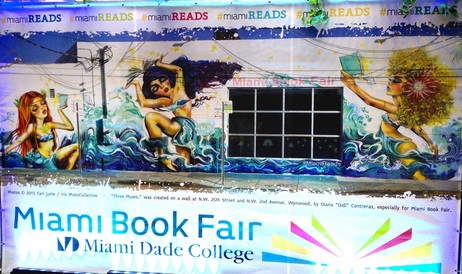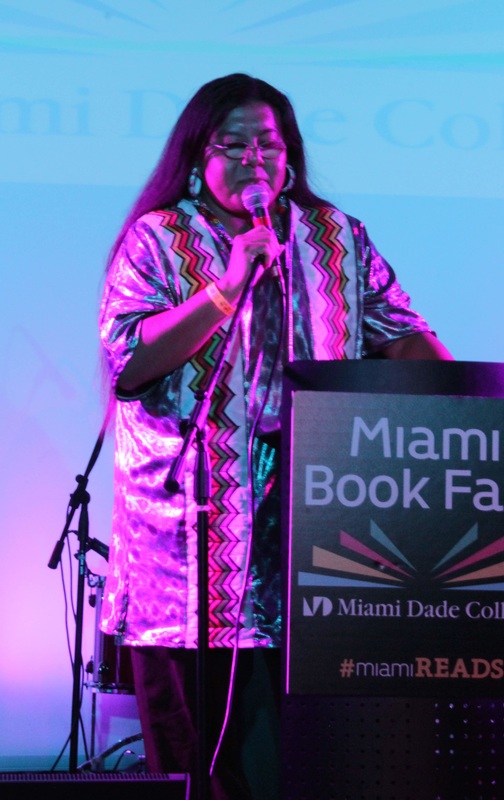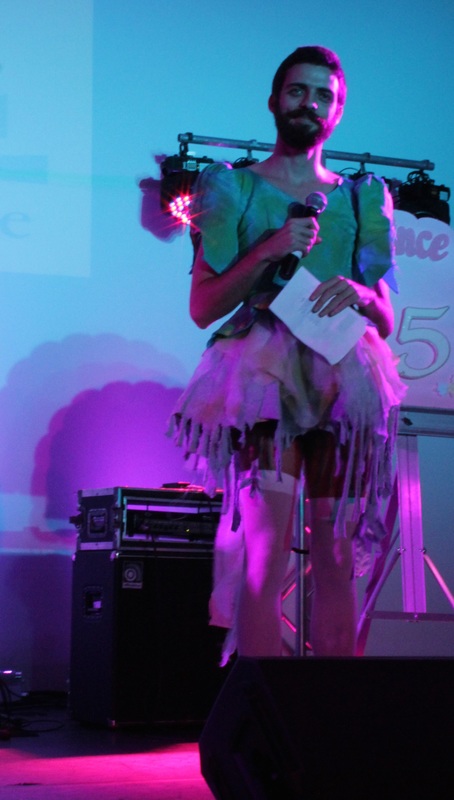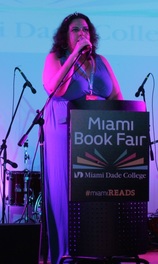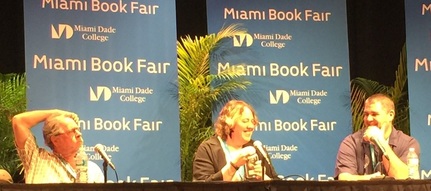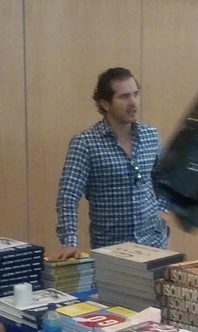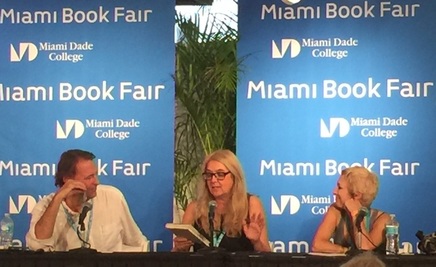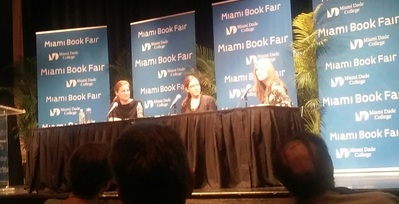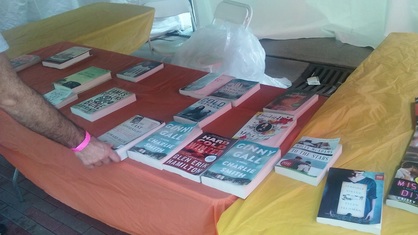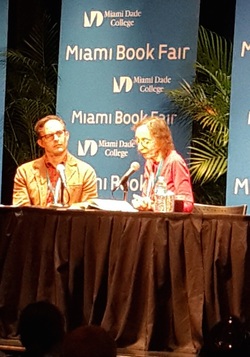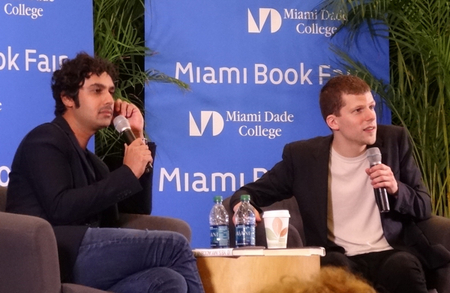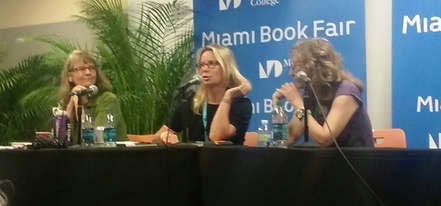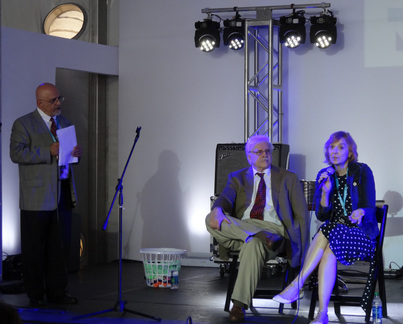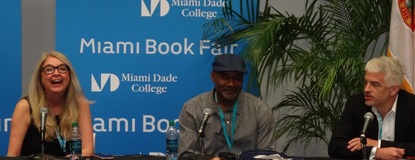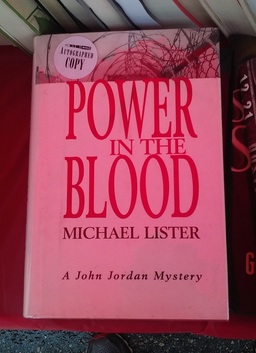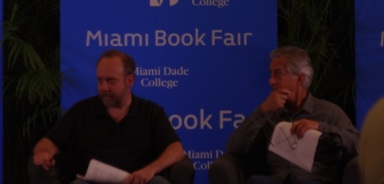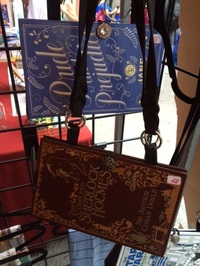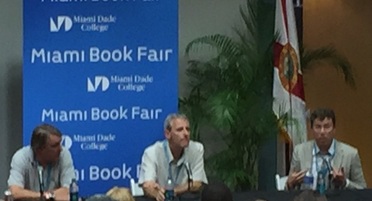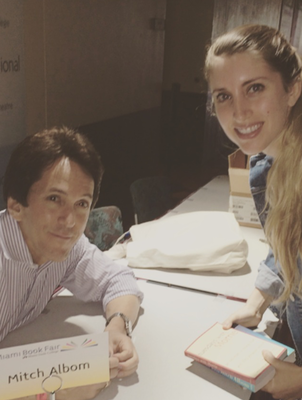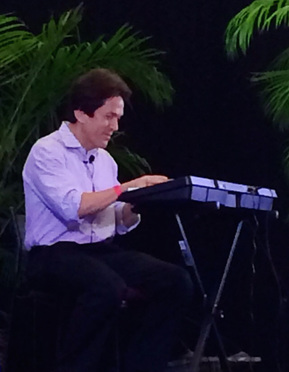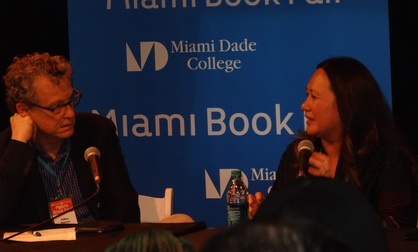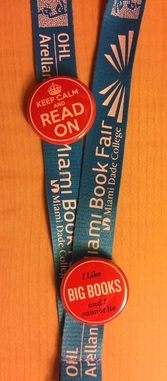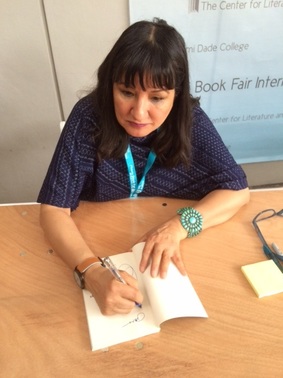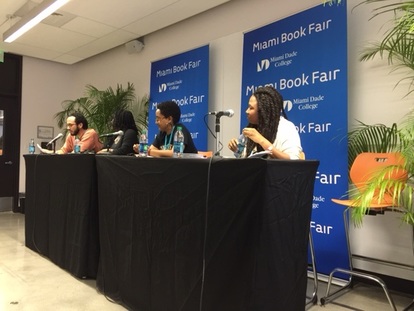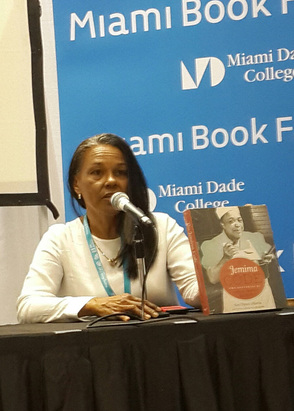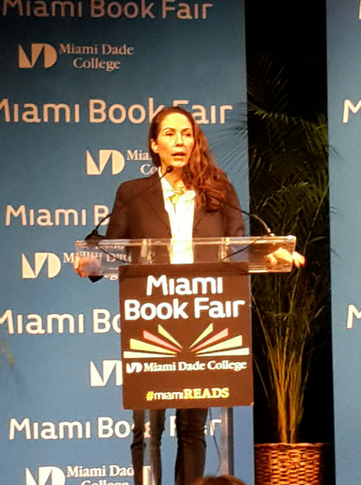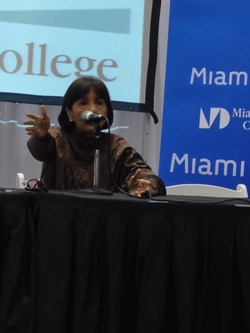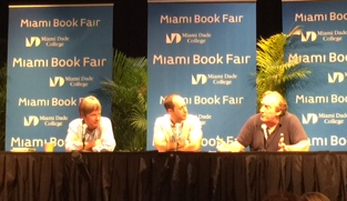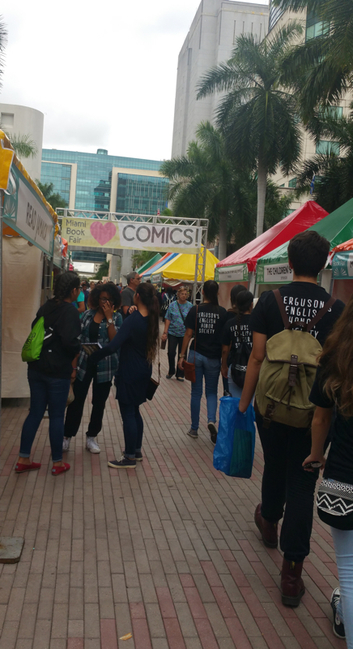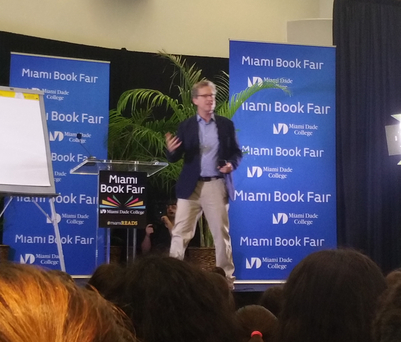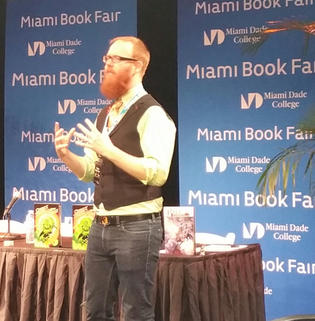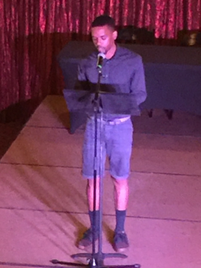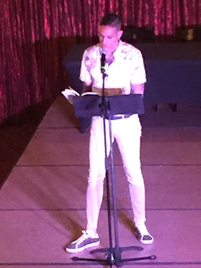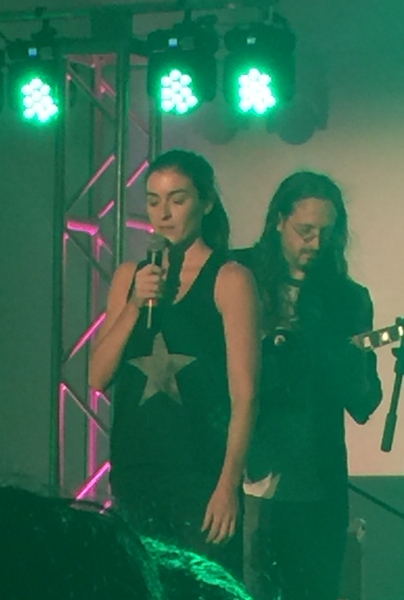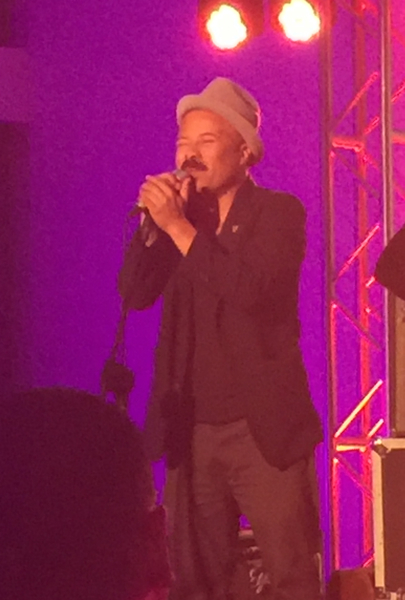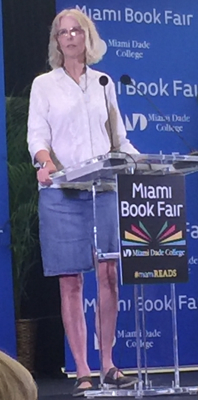Miami Book Fair International 2015 Blog
Join us in person or from afar
EDITOR'S NOTE: This blog is posted with newest items at the top of the left column.
Sunday, Nov. 22
Sunday, Nov. 22, 2015, 9:00 PM
Some Things I Missed About Miami: ◇ Book Deals. The Read to Learn Program, run by talented writers/MBFI superworkers Marci Calabretta and Mary Slebodnik, were selling books for a dollar at the Fair. I got Mexico City Noir for a dollar and supported literacy in Miami. Nice. ◇ Miami folks generally don’t care about the rain. I’ve been in cities where folks constantly complain about the rain and how it prevents them from partaking in normal activities. Definitely not Miami. The Book Fair had plenty of on and off rain during its Friday through Sunday run, but the tents either temporarily closed or patrons just snapped open their umbrellas and went back to book browsing. ◇ Meeting new writers and catching up with long-time writer friends. I met and spoke with (for the first time) Leonard Pitts Jr., Major Jackson, Edwidge Danticat, Elizabeth Alexander, Mary Karr and Angela Flournoy among some of my other personal heroes. I also got to hang out with the lovely Katia D. Ulysse and reunite with Miami writers Jan Becker, Geoffrey Philp, Jaquira Diaz, Omar Figueras, Giselda Aguilar, Laurel Nakanishi and Hector Duarte Jr. My good friends Fabienne Josaphat Merrit and MJ Fievre have new books coming out (Dancing in the Baron’s Shadow and The Sky the Color of Chaos, respectively) and I was excited see them in person again and congratulate them on their continued successes. I also ran into Marlon James at The Standard Party, and super friendly John Yearwood, the World Editor at the Miami Herald. At the same party, I also got a chance to see Laura Lee Patterson Huttenbach, whose new book The Boy is Gone: Conversations with a Mau Mau General just came out, and I spent time with friends/co-workers John Gosslee, the editor of Fjords Review, Andrew Sullivan, the managing editor of Fjords Review, Emi Miller, the editorial assistant of Fjords Review and former journalist/creative writer Jackson Braun. ◇ Reading Queer. I thoroughly support Reading Queer, worked for them before, and was super excited to reunite with the RQ team Neil de la Flor, Jose Portela, Fauzhy Sliba, Laurel Nakanishi and to attend their Festival events. ◇ Dancing. There were lots of opportunities to dance at the Swamp. I danced. A lot. ◇ Seeing professors. I dearly missed Lynne Barrett and Debra Dean, my mentors at FIU and writers I endlessly admire. I was so happy to see them again in the Author’s Lounge and chat about student protests, the writing world and university administration. ◇ The weather. Miami has a wet, thick kind of heat that made my hair puff out instantly. I missed that sticky-hot. I want to pocket a little bit of that heat and bring it back to Mizzou. —Jennifer Maritza McCauley Sunday, Nov. 22, 2015, 7:45 PM
I had an absolute blast at the Queer Quinceañera! RQ alums Houston Cypress, Y’senia Mina and Caridad Moro-McCormick brought the RQ Festival to a close with personal and powerful poetry readings. Las quinceañeras Juleysi & Karla finished the show. They burst into the Swamp, wearing sparkling quince ballgowns. Once they got on stage, the two turned the quince into a sexy, dirty dance party. They sang karaoke to Mariah Carey, the Macarena and other songs, and twerked and twisted. If I had a quince, I’d totally want them there. What a great end to a great fair. —Jennifer Maritza McCauley Sunday, Nov. 22, 2015, 7:12 PM
At the "American Lives: Two Memoirs" panel: John Leguizamo is one of my favorite comedians of all time. I can't think of the 90s without feeling nostalgia for his movie The Pest. And thanks to the Miami Book Fair, I now get to see him on a panel with Rosie Perez. Choice quotes: "My biggest inspirations are Richard Pryor and Eugene O'Neill, which I know are two vastly different people." —John Leguizamo discussing the inspiration for his comedy. "It's my right to tell my story." —Rosie Perez on the backlash she received from her family for writing her memoir. "Ghetto Klown is really about me and my demons." —John Leguizamo talking about his new graphic novel. "I met Spike Lee at a club, we got into a fight. He told me you're an actress. I said, no I'm not. He said yes you are, and he gave his card." —Rosie Perez on meeting Spike Lee for the first time. —Jeffrey Fernandez Sunday, Nov. 22, 2015, 6:15 PM
Just occurred to me that one of the great pleasures of the Book Fair is running into friends at the Street Fair and strolling for a few minutes comparing notes on the Fair and catching up on things bookish and otherwise. —Bob Morison Sunday, Nov. 22, 2015, 6:00 PM
Poet Y'senia Almaguer is giving an amazing reading at the "A Queer Quinceñera" event. —Jeffrey Fernandez Sunday, Nov. 22, 2015, 5:46 PM
The day was nearing to its end when my sister and I decided to return one more time to the Read to Learn booth. It was the first one we visited yesterday when we entered the Street Fair. It was only fitting it should be our last of 2015. Plus, I’d been told the books would be two for $1 in the afternoon. When we arrived, the prices were not what I had been promised. No, instead the volunteers assigned to the booth were yelling at anyone who walked by the new deal: grab a red 2012 Miami Book Fair bag the booth provided and stuff it with as many books as you want (and physically can) for a dollar. One dollar! I took a bag even though I’d been to the tent three other times and had not bought anything. I’d told myself not to buy anything that I wasn’t going to read soon(ish), but fill a bag for just $1? You’d be a fool not to take this offer. At one point as I looked through some books on a table, a man doing the same asked those of us at the table if we wanted some ice cream. He held in one hand an open box of ice cream bars, offering it to any takers. He explained the ice cream vendor down the way was giving out free boxes, and he couldn’t eat a whole pack. So I took a bar and tossed it into my red bag. There were still a bunch of books left, but I only walked away with six, including one of Ridley Pearson’s Kingdom Keepers books, Dark Passage, the sixth of the series, and Melissa de la Cruz’s Gates of Paradise, a Blue Bloods novel. (I saw the authors yesterday at the “Disney Defenders Unite!” panel.) But $1 for 6 books is still pretty good. My sister got an entire class set of The Sea of Monsters, the second book of the Percy Jackson & the Olympians series. In total, she left with two completely filled bags. As we trekked down the street to the Fair’s exit, carrying heavy bags hanging off our shoulders and while I ate my ice cream, a vendor at another tent shouted to for people to take the leftover books. They were free. We kept walking. We had too much already. And so ends my time at this year’s Miami Book Fair. Just remember, if you can afford to wait and control your urge to buy books left and right, next year—if you didn’t this year—wait until the end of Sunday for amazing deals. —Giselda Aguiar Sunday, Nov. 22, 2015, 5:45 PM
So before heading to the Miami Book Fair this weekend, I've been binge watching Jessica Jones, the new Marvel Comics series on Netflix. Thank goodness, however, Tate's Comics is a vendor and has the Alias/Jessica Jones comics. —Jeffrey Fernandez Sunday, Nov. 22, 2015, 5:34 PM
My final sweep of the end-of-Fair sales provided a couple last-minute finds. As I head home, I realize I've managed to complete most of my holiday shopping at the Fair, in under 48 hours and a week before Black Friday. —James Barrett-Morison Sunday, Nov. 22, 2015, 5:33 PM
A question posed to Adam Johnson, Kelly Link and Padgett Powell during their "Short Stories, Tall Tales" panel discussion was: where do you write? Adam Johnson said that with three kids in a small San Francisco home, working there was nearly impossible. Close to his home is the University of California at San Francisco. He often goes to UCSF’s medical library, where he can’t access their Internet. He is best able to focus exclusively on his writing there. Kelly Link said she liked writing in coffee shops in Western Massachusetts, where she lives. She and her fellow writing friends write together simultaneously, and this creates a nice energy that motivates her. Padgett Powell explained that where to write depends on each writer’s preferences. To explain his point, Powell relied on Tennessee Williams, who often wrote down in the Florida Keys, that no place was consistently perfect for writing. Every writer has to find it out for himself. —Kate Cruz Sunday, Nov. 22, 2015, 5:26 PM
The “Short Stories, Tall Tales” panel featured Padgett Powell, Kelly Link, and Adam Johnson. Powell, the first to read, explained the original subtitle to his book Cries for Help, Various: Stories was “45 failed novels.” He added, “I’m going to prove it,” before reading, “The Retarded Hermit.” At one point, he stated it’s “hard to read with the air sucked out by a better person,” referring to Johnson who won the National Book Award for Fiction this year. Powell’s voice and deadpan humor reminded me of the actor Nick Offerman from Parks and Recreation. Link read from “I Can See Right Through You” from her newest collection, Get in Trouble: Stories. The short story is about a character named “Demon Lover,” an aged actor who once played a vampire in a movie and had an embarrassing sex tape leaked. Before reading, Johnson, a professor of creative writing at Stanford, praised Powell as having influenced a whole generation of writers and said that he has taught Link’s work in his classes. He read “Dark Meadow” from Fortune Smiles, a story about a man called Mr. Roses, who reminded me of Humbert Humbert from Lolita when he reveals he has feeling toward one of the two girls living alone in an apartment while their mom is gone. During the Q&A, the authors explained where it is they write. Johnson stated at a medical library with doctors and homeless people. Link works with two other writers. Powell said, “experiment until you find what works for you… write as you may.” —Giselda Aguiar Sunday, Nov. 22, 2015, 5:25 PM
I’m on my way to the Queer Quinceañera at The Swamp. The tents are already closing down, the books are being packed away and the patrons are on their way out. I always get a little sad when the poles are dismantled, and the cardboard boxes are sealed. Feels like Christmas is over. I don’t want Christmas to be over. —Jennifer Maritza McCauley Sunday, Nov. 22, 2015, 5:23 PM
My favorite Miami drag queens, Juleysi and Karla, are hanging out at The Swamp getting ready to host the @readingqueer event "A Queer Quinceñera". —Jeffrey Fernandez Sunday, Nov. 22, 2015, 5:20 PM
As I leave, left to wait 51 more weeks until the next Miami Book Fair, I realize it's been an economical Fair for me. The weekend's haul totals seven books for which I spent a total of seven dollars. I spent three dollars on David Rosenfelt's Hounded at the Murder on the Beach tent, scored two freebies from the abandoned HarperCollins tent, and got four books—three kids books for my daughters and a mint condition trade paperback copy of John D. MacDonald's The Dreadful Lemon Sky—for one dollar each from Pennywise as they went into full inventory liquidation mode at 5:00. —Ed Irvin Sunday, Nov. 22, 2015, 5:00 PM
I just came out of an excellent panel featuring Adam Johnson, Kelly Link and Padget Powell. All three writers were witty, whip-smart and entertaining. The authors read work that showcased their distinct styles, talked about how to navigate the literary market and how to stay true to your writerly instincts, and not just subscribe to literary trends. By the way, Padget Powell is a certified boss. He’s one of those people that is mysteriously and effortlessly funny. In my fantasies, Powell stars in an HBO comedy show a la Curb Your Enthusiasm that affectionately skewers the literary scene. —Jennifer Maritza McCauley Sunday, Nov. 22, 2015, 4:40 PM
In introducing the "Two U.S. Poets Laureate," Campbell McGrath described how diverse the Poet Laureate position has become. Not just in terms of gender and ethnicity, but of poetics. Former Laureate Kay Ryan has a bit of Dickinson, current Laureate Juan Felipe Herrera a bit of Whitman. That proved fair warning. Ryan's poems are superbly compact. Words rhyme and echo and play off their neighbors. Many short poems meant many themes: Musical chairs is a game of banishment. Arrowheads show that you can explain the precise by way of the less precise. It's even hard for Thelonious Monk to play Monk. When do we really want to sow those dragon's teeth? You want each poem to go on, but you've already had a full portion. She interrupted poems to offer her own commentary and reveal some of the "private amusements" embedded therein. Then reread them to even greater effect. Herrera is expansive. And ultimately idealistic? A lengthy poem has two women intercepted at the Mexico-U.S. border sitting on a detention bus headed for . . . where? In Spanish and English, their anxiety becomes a chorus, as the poem sorts through where they come from. They come from someplace they wanted to escape. Then again, like all of us, they "come from everything." He also read from his first book, without poem titles, page numbers, or paper that stands the test of time. "But it's what we sounded like with long hair and a big guitar." He was self-effacing and funny in the way that doesn't distract, but amplifies his presence. Diversity, indeed. Two very different ways that poetry can reverberate long after the session ends. —Bob Morison Sunday, Nov. 22, 2015, 4:30 PM
After having spent dozens of hours since the summer interviewing my father about his experiences in Cuba, transcribing my notes and then writing a draft of a memoir, I had a sense of the hard work Jo Ivester faced when she embarked on her writing project. During a span of five years, she dedicated 1,000 hours to reviewing her mother’s stacks of journal notebooks and listening to her mother’s anecdotes. Ivester’s dedication paid off with the publication of The Outskirts of Hope: A Memoir of the 1960s Deep South. In an April interview with The Austin Chronicle, Ivester, who lives in Austin, described the story behind her book: “In 1967, when I was 10-years-old, my father quit his pediatric practice in Boston to manage a new clinic in Mound Bayou, a historically all-black town in the cotton fields of Mississippi. Within weeks of our arrival, my mother, Aura Kruger, was recruited to work at the local high school, where she was the only white teacher.” After Ivester’s father uprooted his family to join President Lyndon B. Johnson’s War on Poverty, her family became one of only two white families, and the only Jewish one, in Mound Bayou. Ivester said she kept a journal during her two years in Mississippi, but unfortunately when she was teenager she burned it because its contents “embarrassed” her. So she had to recreate her memories of the time. Ivester told The Austin Chronicle that forty years after her family left Mississippi, “my mother, then in her eighties and living with my family in Austin, started a journal. Every day she wrote for 20 minutes.” Ivester’s mother then handed her a stack of notebooks and said “publish this.” The seed of Ivester’s book was in those journals, but Norman Lear, a family friend, helped shape her narrative. Lear, who created the 1970s sitcom All in the Family, suggested that to appeal to a larger audience, Ivester should focus on her family’s time in Mississippi. Later Ivester’s editor asked her to commit to return to Mississippi. “Going back started my journey as a writer,” she said. —Roberto Manzano Sunday, Nov. 22, 2015, 4:25 PM
I keep seeing John Leguizamo walking about. A great reminder of how easily you can come across the most talented individuals at the Miami Book Fair. —Jeffrey Fernandez Sunday, Nov. 22, 2015, 4:24 PM
I'm never sure if the Miami Book Fair is a book addict's best dream come true, or worst nightmare come to life. I just want to buy as many books as I can. —Jeffrey Fernandez Sunday, Nov. 22, 2015, 4:18 PM
Around 3:30 PM, my friend Johana and her friend Stephanie left the Book Fair. My sister and I weren’t going to another panel until 4:30, but the rain had stopped and the sun had reappeared, to make the day the nasty mugginess it was in the morning. I wanted to go to any panel just to be indoors with A/C. Since we were by the Books and Books stall outside Building 1, I took out my guide to see what events were going on there. “Knitting Pearls: A Reading” started at 3:30, and I knew one of the panelists, Cindy Chinelly, from Florida International University, and had seen Ann Hood on an earlier panel in the morning, so we made our way there. The reading, featuring Michael Ruhlman, Hood, and Chinelly, was underway when we entered the blessedly air-conditioned Centre Gallery. Ruhlman spoke about his daughter, how he didn’t know what she was up to until one day he found her in her room with a bag full of yarn. He realized she had taught herself how to knit and because of that, knew everything would be okay. Hood joked that if there had been a high school superlative “Least likely to knit,” she would’ve won it. However, after she lost her five-year-old daughter, she couldn’t read or write. In order to cope with the grief, she started knitting, after rejecting her friend’s first suggestion: upholstering a couch. Hood listed some of the contributors to the anthology she edited, Knitting Pearls: Writers Writing About Knitting, including Chinelly, who read her piece, “Unraveling.” The essay is about Chinelly knitting to try to not think about her son and suffering, but it has the opposite effect. While knitting she thinks of the past, before and after the troubles started, and questions what the future will be. After the reading, Chinelly stated she interwove the subject of knitting into the narrative to avoid “falling into sentimentality.” Hood added that knitting acts as somewhat of a “buffer” to their emotions that allows them to write about grief. To bring some lightheartedness to the conversation—and also to show the range of this collection—Hood read a part from Ann Leary’s essay, which started off by being critical of knitters and their little nods that show they know they’re “perfect.” Hood isn’t sure if she’ll edit another anthology on knitting, Knitting Pearls being her second. I have wanted to learn to knit for several years now, and this panel made that desire stronger. This event reminded me of Agatha Christie’s Miss Marple, who knits when she needs to be alone and think about some puzzling mystery. Knitting is definitely, as Chinelly said, a “time to be quiet.” —Giselda Aguiar Sunday, Nov. 22, 2015, 4:12 PM
"All books are science fiction because telepathy isn't real." Cory Doctorow during the "Crossing Over: Comics and Prose" panel. —Ed Irvin Sunday, Nov. 22, 2015, 4:04 PM
Wayne Wiegand's presentation on Part of Our Lives: A People's History of the American Public Library was excellently attended by an audience enthusiastic about the history and future of the library. Wiegand set it as his goal to persuade us to broaden our thinking on public libraries, not just as providers of information but as key public spaces and distributors of transformative works. His presentation included clips, excerpted from an upcoming documentary, of Americans telling their moving stories of how libraries have enriched their lives. Unfortunately, some technical difficulties interrupted the presentation, which cut off both the concluding thoughts by former Miami-Dade Public Library director Raymond Santiago, and the audience's opportunity for questions. Thanks to both Wiegand and Santiago for sticking around after the panel to answer questions in the hallway. —James Barrett-Morison Sunday, Nov. 22, 3:55 PM
Lauren Groff believes that it is probably best if, within a marriage, the partners don't tell each other everything. They should maintain a "dark space" in which they keep things best not known by the other. During the Q&A a man questions this idea, saying that he couldn't accept that his wife, to whom he's been married 56 years, has been keeping something from him. "Maybe that's why she hasn't told you," Groff replies to a burst of laughter from the audience. A woman tells Groff that she is a member of a reading group comprised of mostly lawyers and psychologists, and it was the latter who recommended Fates and Furies. Groff chuckles and says that she tells people that her book is not one that psychologists would recommend, and she is happy to hear that she is wrong. An audience member asked what two books the authors would use to compare their own to when trying to persuade someone who hasn't read them that they need to. "That is a really good question," Groff says. "Nell?" Crosley says that the best description of The Clasps came from a blurb that read "It's like The Goonies written by Laurie Moore." "I have no desire to tell you what my book is about," Groff says. "You tell me what my book is about." —Ed Irvin Sunday, Nov. 22, 3:41 PM
While Nell Zink describes the family dynamic of Mislaid, a dynamic she says is unique to the south, Groff interrupts, reminding Zink that they are in the south. The comment nets a simultaneous groan from the audience, as well as cries of "Miami is not the south!" —Ed Irvin Sunday, Nov. 22, 3:33 PM
Zink, whose Mislaid is about a young woman in 1960s Tidewater Virginia suffering from a gender identity crisis, says that she is fascinated by such identity crises, having known people who went through similar ordeals. The protagonist believes she is a man because she is attracted to women. She doesn't know what a lesbian is because of the sheltered environment of Tidewater. The character eventually assumes a black identity, something her agent told her was implausible. Then Rachel Dolezal came along and "simplified my life," Zink says. Zink decided to write a race-gender, gender-race novel because those are the topics that people are talking about. When she took the book to her agent she was told that there wasn't enough racism in it, that the people were too nice. She decided to ramp up the racism, inserting inappropriate jokes, only one of which Zink said she would ever repeat in public. Publishers then refused to touch the book because of its rampant racism. In the end, Zink removed the racial undertones because, "Any racism that's in here can be used as a soundboard against me." —Ed Irvin Sunday, Nov. 22, 3:24 PM
"My book isn't about the family you have," Sloane Crosley says. "It's about the family you find." After the words come out of her mouth, Crosley compares them to the tagline you'd find on a poster for a cheesy coming-of-age Hollywood film. If she transfers her personality to the page, her books must be fantastic. —Ed Irvin Sunday, Nov. 22, 3:07 PM
The authors on the "Family Stories" panel are Lauren Groff, whose Fates and Furies recently won a National Book Award, Sloane Crosley, author of The Clasps, and Nell Zink, who wrote Mislaid. The authors each discuss their work before conducting a roundtable-type discussion during which they ask one another about their work. Crosley, who wrote nonfiction before penning The Clasps, is asked by Groff about the decision to transition from nonfiction to fiction. Crosley says that she wanted do delve into a world that she could make up without getting into trouble for it. The Clasps features an extravagant Miami wedding. "Please do not judge me for how wrong I have gotten your city," Crosley tells the audience. —Ed Irvin Sunday, Nov. 22, 2015, 3:05 PM
Roaming around from tent to tent, we stopped by Pennyworth, which was five tents together. All books had been slashed down to $2. From my previous two years coming to the Street Fair, I knew booths would start drastically reducing their prices as Sunday’s end neared. My friend Johana and her friend Stephanie found a few things and so did my sister at Pennyworth. I had yet to buy any book, having left the Fair last night with zero books. I have way too many unread ones at home that I need to get through. I already have three small stacks on the floor because they don’t fit in my filled bookcases. So I didn’t feel too bad at not having bought any books at a book fair. As we were walking away from Pennyworth, I spotted Agatha Christie’s Partners in Crime, a book which influenced me in writing my MFA thesis of mystery short stories. But alas, I already own the book, so I kept walking. Underneath Partners in Crime was another Christie book: Parker Pyne Investigates. Not only do I not own this book, I have never read it! I grabbed it and flipped through the pages. Like many of the other books that faced the street, Parker Pyne Investigates had some water damage thanks to some of the rains of the day. I lamented the fact out loud—I was still going to get it, though; only $2!—when my sister passed by and whispered, “They’ll work with you.” She explained she overheard the people in charge reduce the price for a woman who’d gotten some watered books. When I went to the cashier, I showed the wet corner of the book, and I only paid a dollar! —Giselda Aguiar Sunday, Nov. 22, 2015, 3:00 PM
Susan Casey is among the attendees of the "Family Stories" panel, which includes recent National Book Award winner Lauren Groff. Now I'm paranoid that Casey thinks I'm stalking her. —Ed Irvin Sunday, Nov. 22, 2015, 2:58 PM
The "Florida Histories" panel drew a good crowd. Louise Kemp Poole led off with Saving Florida: Women's Fight for the Environment in the Twentieth Century. She gave a slide-show chronology of the individual women and women's clubs who fought the massacre of birds to provide plumage for ladies' hats (and founded the Florida Audubon Society), protected Royal Palm in the Everglades as the first state park, and helped establish the Canaveral National Seashore and Biscayne National park. The other Marjories (Kinnan Rawlings and Stoneman Douglas) are better known, but Marjorie Harris Carr successfully fought construction of a cross-state barge canal. Lyn Millner introduced The Allure of Immortality: An American Cult, a Florida Swamp, and a Renegade Prophet with a slide show. Late in the 19th century, Dr. Cyrus Teed, a self-styled Messiah, and his followers, the Koreshans, decamped from Chicago to build their socialist-religious-utopian community in what is now Estero, FL. They believed in sexual equality, strict celibacy, and that they lived in the interior of a hollow Earth. Millner read passages about the arrival of Teed and his advance guard in their promised land (and the strange character they purchased it from), singing hymns as they worked their way up a river of sorts to find the high ground. If you're on a mission from God, you can be oblivious to how dislocated you are. Doris Weatherford, who has written and compiled a variety of books on notable women, discussed They Dared to Dream: Florida Women Who Shaped History. Her preferred title for the book would have dropped the "dream" business and just said "Always There" to make a difference. Her knowledge is encyclopedic. She started with Florida's matrilineal Native American society: "There were no bastards. Everyone has a mother." And Pocahontas is "not just Disney." Women could decide the fate of a prisoner. She ended with the suffrage movement and the ongoing battle between states' rights and women's rights. Florida could have been the first state to ratify the nineteenth amendment in 1919, but a "no" vote would have set back the ratification process nationwide. Women leaders intervened, and the legislative session ended without taking a vote. Florida finally got around to ratifying the amendment in 1969. —Bob Morison Editor's note: Read James Barrett-Morison's review of The Allure of Immortality on our Florida History page. Sunday, Nov. 22, 2015, 2:57 PM
HarperCollins has abandoned their tent, forced away by the rains and leaving behind a bunch of free but waterlogged books. —Ed Irvin Sunday, Nov. 22, 2015, 2:30 PM
During one of the bouts of rain, my sister and I made our way to the food court, composed of tents and food trucks, to have lunch. There I met my friend and coworker Johana and her friend Stephanie just as they were buying food. The four of us managed to get a table under a sheltered area, so all was good. My sister and I got pinchos, or kebabs, and my chicken one was delicious. We shared some mojito fries from the Top Fries truck. The garlic was a bit strong. Wish they’d had ranch dipping sauce to go with it. As we ate, we talked about the struggles Johana and I face as writing tutors, trying to make college students understand that even if they don’t want to be writers, they’re going to have to learn how to write if they wish to be professionals in today’s workforce. We moved on to discussing one of my favorite topics: the Harry Potter series. Good food, good friends, and good books. What more can one ask for? —Giselda Aguiar Sunday, Nov. 22, 2015, 1:39 PM
After their readings, Jesse Eisenberg and Kunal Nayyar sat down to discuss their works and have a Q&A session. Eisenberg started off by saying he’d read Nayyar’s book to see the differences in their childhoods, one growing up in a Hindu home in New Delhi and the other in a Jewish home in New York, but it was “the opposite”: they shared more similarities than differences. Then Eisenberg asked Nayyar if he’d ever considered being a stand-up comedian, but, instead of letting Nayyar answer, Eisenberg answered the question for himself. This caused the audience to laugh and Nayyar to ask, “Are you interviewing yourself?” Eisenberg uses fiction to bring out funny moments because he can’t with his real life. He compared acting to drumming: it’s hard to do on your own without others to accompany you. Writing can be done alone like playing the guitar. In answer to a question on how best they work when writing, Nayyar said he works with a writing partner, who is better at structure while Nayyar is better at dialogue. Eisenberg said he works alone because he would becoming “controlling.” Eisenberg acts to make a living so he can write what he sees as “pure” to him. An audience member asked about writer’s block. Nayyar stated people get writer’s block when they get “anxious about getting it right.” I enjoyed hearing these actors read and talk about writing because it was obvious they know the struggles of a writer and aren’t celebrities who “wrote” a book. It’s always disappointing to find out someone didn’t actually write his or her book, so I’m glad today’s event was not like that. —Giselda Aguiar Sunday, Nov. 22, 2015, 1:34 PM
Made eye contact with Joyce Carol Oates. Lasted like two seconds. It's the little things in life. —Stephanie Selander Sunday, Nov. 22, 2015, 1:33 PM
As I leave building eight after "The Natural World" panel I stop by the Murder on the Beach tent, hoping they've put more used inventory out. The store's Joanne Sinchuk has put away the new inventory they brought with them from Delray Beach, not wanting to risk water damage, and is spreading out the used books to fill her tables. She tells me that many of the larger booksellers have closed up their tents and gone home. —Ed Irvin Sunday, Nov. 22, 2015, 1:32 PM
I've been a fan of Cynthia Barnett since her 2007 book Mirage, on the decline of Florida's water resources. So I was thrilled to see her speak on her new book, Rain: A Natural and Cultural History, at the "Natural World" panel this rainy afternoon. She framed her presentation as a defense of rain, a phenomenon alternately misunderstood, feared, beloved and worshiped in human culture. And she emphasized the effects rain has had on history, from the rise and fall of the ancient river-valley civilizations to the opposition to 19th century British weather forecasting—predictable weather was bad business for the lucrative ship-salvage sector. Susan Casey and Sy Montgomery, also in the panel, spoke about their personal experiences with aquatic life, Casey (Voices in the Ocean) on dolphins and Montgomery (The Soul of an Octopus) on octopuses—not octopi, as she corrected us! All together, a good set to hear on a wet, rainy Florida day. —James Barrett-Morison Sunday, Nov. 22, 2015, 1:30 PM
It's been a long time since I've geeked out over meeting an author and getting an inscription, but that's exactly what I'm doing after meeting Susan Casey. —Ed Irvin Sunday, Nov. 22, 2015, 1:29 PM
Steve Moss of Books & Books who has been working at the book fair for about 20 years said that this is the chance to connect the community of book readers. When asked what genre he thinks sold the most last year, he said he thinks fiction and when asked why he thinks this is, he said, “There’s so much going on in the world that people want to escape from it.” I agree. And there’s nothing more pleasing than a warm café con leche and a good book to help you unplug and unwind. —Mariagracia Boscan Sunday, Nov. 22, 2015, 1:23 PM
So much for the budget. Had to buy all three books after yesterday's "Puzzling Mysteries" panel and both books after today's "Sports Center." Maybe if I read fast I can re-gift a couple this holiday season. —Bob Morison Sunday, Nov. 22, 2015, 1:19 PM
So much on-stage awkwardness between Kunal Nayyar (The Big Bang Theory) and Jesse Eisenberg (Adventureland). Here's a for instance: Kunal reading from his new book Yes, My Accent is Real: and Some Other Things I Haven't Told You, "I hope there will be a plethora of lonely beauties looking for companionship." He then went on to allow what he has just read wash over him admitting "That sounds creepy now that I say it out loud. Jesus." Perhaps some actors aren't so different from their on-screen characters, after all. —Danielle Ammirata Sunday, Nov. 22, 2015, 1:17 PM
Biscayne Bay Brewing Company was back in business outside The Swamp in time for me to wash down my lunch with an appropriate beverage. The proprietor had left the operation in the hands of volunteers, and someone had cross-circuited the beer lines, so the Golden Ale tap was dispensing the Saison, and vice versa. As my good deed for the day, I pointed that out. But on second thought, I may thereby have deprived some Fairgoers of sampling a craftier beer. —Bob Morison Sunday, Nov. 22, 2015, 1:14 PM
Joyce Carol Oates just said the GOP candidates were like a cast of characters from Alice in Wonderland! —Carolyn Pledge Amaral Sunday, Nov. 22, 2015, 1:13 PM
"I am thrilled to join this aquatic triad of mermaids up here," says Sy Montgomery as she approaches the podium to discuss The Soul of an Octopus: A Surprising Exploration into the Wonder of Consciousness." It's obvious from the start that, if anyone can match Cynthia Barnett's enthusiasm for rain, it's Montgomery and her love for cephalopod molluscs. Montgomery describes one of her first encounters with an octopus, during which the creature ran its tentacles up and down her arm. Before long Montgomery realized that the pressure she felt the octopus applying was its suckers and that the animal was tasting her. "Now, if a human had done that I would find it weird," she says. During the time she spent with the octopus its color changed from a reddish-orange to white, which is the color of a relaxed octopus, Montgomery explained. Octopuses—not octopi, as she corrected an audience member—are the fastest growing organisms in the ocean. They hatch from eggs the size of a grain of rice and grow to be as big as 100 pounds within three to five years, which is the maximum lifespan of the largest species of octopus, the Giant Pacific Octopus which, even at that size, can pour itself into a crevice the size of an orange. "Octopuses don't wear their hearts on their sleeves," Montgomery says. "But they do wear their emotions on their skin." —Ed Irvin Sunday, Nov. 22, 2015, 1:10 PM
At Chapman, hearing actors Kunal Nayyar and Jesse Eisenberg read from their new books. Eisenberg read three stories from his collection Bream Gives Me Hiccups and Other Stories. The narrator of the pieces is a nine-year-old boy from a broken home. The stories are restaurant reviews the boy writes, rating a restaurant out of 2,000 stars, but within them, the boy chronicles his relationship with his mother. In one narrative, the boy states, “Lies are for adults who are sad in their lives.” Nayyar’s Yes, My Accent is Real: And Other Things I Haven’t Told You covers his childhood in New Delhi and crosses two continents. Before he read from it, Nayyar explained the book was composed of the embarrassing moments in life “too silly for fiction.” He changed all the names, however, “because I didn’t want to get sued.” The essay he read, titled “The Forbidden Kiss,” is about the first girl he kissed in the U.S. when he came for college. He and the girl he liked saw the movie Ghost in her dorm room after a Thanksgiving dinner. After they kissed, the girl stopped it from progressing, pointing out that as a Mormon she couldn’t be with a Hindu. He realized that his cultural background, which cannot be changed, prevented him from having a connection with another human being who also wanted to connect. —Giselda Aguiar Sunday, Nov. 22, 2015, 1:05 PM
Susan Casey is here to discuss her newest book, Voices in the Ocean: A Journey Into the Wild and Haunting World of Dolphins. Casey says, "The human relationship with dolphins is a rainbow spectrum of extremes." On one extreme, dolphins are seen as aquatic companions. Friendly and smart, dolphins have been known to aid people lost and adrift at sea. On the other extreme, the military is developing ways to weaponize dolphins, trying to make them the suicide bombers of the sea. They are killed for their teeth, which are used as both currency and jewelry in some parts of the world. "A dolphin brain is very similar in shape to a human brain," Casey says. "Only 20 percent bigger and astonishingly different on the inside." Casey says that her books normally take five years to write, in part because "When I write my books I immerse myself quite deeply—literally—because I write about the oceans." She added that, while writing Voices in the Ocean, she set out to meet as many people involved in the many facets of the dolphin industry—from the activists trying to halt the slaughter of dolphins to the traffickers involved in the highly lucrative business of providing dolphins to theme parks, something I thought would be heavily regulated. —Ed Irvin Sunday, Nov. 22, 2015, 12:39 PM
Cynthia Barnett's enthusiasm for rain comes through not only in the title of her book, Rain: A Natural and Cultural History, but also in the poetic way she describes it: "I love the applause of rain on palm fronds." "Today I'm going to come to rain's defense," Barnett says, discussing all the misconceptions people have about rain, including the shape of a raindrop, which is similar to that of a parachute, not a teardrop, as we are led to believe. Rain is responsible for more than we know, Barnett explains, saying that "We can even thank rain for the bluest blues in the sky. Dearth of rain means dearth of color." Something that fascinates me is the origin of the finger wrinkles one obtains after a long bath or dip in the pool. These have nothing to do with the body's absorption of water, Barnett explains, but rather with our bodies adapting to their environment. "Our finger wrinkles are essentially rain treads," she says. Studies have shown that dry surfaces are easily gripped by flat, dry fingertips, whereas wet, slippery surfaces are more easily grasped by wrinkled fingertips. —Ed Irvin Sunday, Nov. 22, 2015, 12:28 PM
It was Susan Casey's The Devil's Teeth that inspired me in 2007 to go diving with the same great white sharks that migrate to California'a Farallon Islands featured in her book. I am thrilled to finally have the opportunity to meet her and pick her brain during "The Natural World" panel. —Ed Irvin Sunday, Nov. 22, 2015, 12:22 PM
For this year's sports-themed panel I chose "Sports Center." Guessing the program committee couldn't come up with a more specific title to cover both Diane Roberts' Tribal: College Football and the Secret Heart of America and Doug Merlino's Beast: Blood, Struggle, and Dreams at the Heart of Mixed Martial Arts. But on further review, they could have included "heart" in the session title, or maybe "primitive cultures." Merlino explained the basics of MMA, a mix of boxing, kick-boxing, jiu jitsu (in many variations), and wrestling (the real kind). You get in the cage and try to demolish your opponent by whatever combination of methods it takes. It's totally bloody and brutal, and it's the fastest growing spectator sport in the U.S. and gaining popularity around the world. The sport hasn't seen much serious journalistic treatment. Merlino went to one of the three biggest training centers, up the coast in Coconut Creek, where "it looked like the gladiator training scene in Spartacus." The coaches invited him to hang around and learn what MMA is about. The book follows four fighters: a veteran who is slowing down but doesn't want to quit (buoyed by his popularity in Russia), a top prospect (a Bosnian refugee who started fighting at 15), a collegiate and Olympic wrestler (can he make the adjustments?), and a high school wrestler and ex-convict who started at the lowest rung (cage fighting in bars). In the course of two years following MMA, Merlino started training and even sparred (sort of) with a coach. He read two sections of the book. The first was on how MMA taps into our anxieties and the ideology of toughness, and why calling someone a "beast" is the highest form of approbation. The second described his sparring sessions and how primal fear turns into primal rage. Roberts described how college football satisfies the tribal urge to form groups and prefer our own. Rabid college football fans bleed their school colors and despise the fans of the cross-state rival. The fact that the two schools are pretty interchangeable in most respects is not just unacknowledged, it's unthinkable. College football is about identity: "We cheer, therefore we are." And it's about religion, a Saturday liturgy. People used to get as dressed up for football games as for church. Teams have chaplains. In large state schools, especially in the south and midwest, separation of church and state is not strictly observed. Roberts read from a section on Tim Tebow, the University of Florida Heisman Trophy winner and above all fundamentalist Christian. He is "the acme of godly jockhood," and "the chosen one" (though not by the NFL). His post-touchdown kneel-and-pray is trademarked. 43% of Americans believed that God helped him win football games. Roberts' stance is engaging--funny, straight talking, bit of country, with a playful undercurrent of "Can this really be serious?" I asked Merlino about the MMA's management, assuming that it must be better than boxing's or "professional" wresting's. I was wrong. The operation is totally centralized and controlled by a pair of brothers whose day job is operating casinos. You don't want to know who their connections are. Fighters and media rights are captive (which explains why I couldn't find a clip on the Internet of Rhonda Rousey being knocked out the other day). Most fighters are poorly paid. Roberts remarked that it's an even worse business model than the NCAA's. The panelists talked about concussions and other head injuries, which are finally under scrutiny in football at all levels. Roberts said that the real problem seems to be the accumulation of all the less-than-concussive hits to the head: "There's a reason you don't shake a baby." The NCAA will only make real changes when it costs them money. In the meantime, the Ohio State football program is valued at over $1 billion. And kids play tackle football as young as age five. Merlino added that the situation is cut-and-dried in MMA. You sign up for a brutal sport, and there's nobody to sue. They ended on gender issues. In college football, cheerleaders may be gymnasts, and there's intense competition to become, for example, a baton-twirling Alabama Crimsonette. But women are relegated to the sidelines and halftime show. MMA, in contrast, is an equal opportunity sport. Men have been doing it longer, but Rousey is the current #1 draw. A true beast. —Bob Morison Sunday, Nov. 22, 2015, 12:15 PM
Inside with its hodgepodge of stools, chairs, benches, and sofas, the Swamp hosted the “Qué pasa en mi casa?” panel. The director of Miami Dade College’s (MDC) Teatro Prometeo, Joann Maria Yarrow, introduced Pepe Bahamonde, executive producer of the TV show ¿Qué Pasa, U.S.A.? Even though the show was filmed from 1975 to 1980, Bahamonde stated the premise and experiences portrayed on the show of a Cuban family trying to live the American Dream, “is still happening today.” It’s international now—as in not only a Cuban experience—but it’s the same. Bahamonde explained that three people from MDC created the show, plus some of the actors were from Prometeo. Bahamonde was director of the bilingual program, which is now the InterAmerican campus of MDC, when he was brought onboard to create and produce ¿Qué Pasa, U.S.A.? The two joining Bahamonde on stage are actors Ted Janus, who played numerous small roles on the show, and Barbara Ann Martin, who played the American friend Sharon. Janus, as Bahamonde elaborated, was also the script reader. Being a monolingual script reader for a bilingual show, Janus explained that he still knew what was happening in Spanish because of the reactions and dialogue in English. After the show ended in 1980, Martin went on to produce mainly Hispanic projects and worked for different networks. Janus, as a lyrical tenor, worked for cruises and taught music. Since ¿Qué Pasa, U.S.A.? was produced with public funds, there are no copyright laws protecting it. Martin said general audience commercials reflect the changing demographics and how networks want Hispanics to tune in by including Spanish phrases and lines in national English commercials. During the Q&A, someone asked, why hasn’t a show come close to what ¿Qué Pasa, U.S.A.? was? Martin quickly answered, “The writing.” I have to say, I agree with the man who asked the question because while I see more and more Hispanic actors and Spanish spoken in American shows, which is great, none can compare to ¿Qué Pasa, U.S.A.? which showed the struggles and hilarity of the Peña family with three generations living under one roof trying to make it in America while still wanting to keep their Cuban identity. The fact that it used Spanglish made it even more realistic. Before the event ended, Bahamonde introduced Qué Pasa en mi Casa? a “sitcom for the stage” in the vein of the old TV show. The “family dynamics are recognizable.” The neighborhood is different from when the Peña family lived there, but the names of the family members are the same because when Bahamonde created the original characters, he borrowed the names from his family, so he used them again. After the introduction, Bahamonde, Janus, and Martin left the stage and a scene from the play Qué Pasa en mi Casa? was performed. —Giselda Aguiar Sunday, Nov. 22, 2015, 12:00 PM
The Book Fair this year was filled with locals and out of towners like Marcela Barretto, visiting from Brazil, who loves to read. “I can read just about anything,” she said, clutching a stack of books. Her strategy for narrowing down what books to get? First, judge the book by its cover and then, search the book comments in the Goodreads app to help you decide which ones to get. —Mariagracia Boscan Sunday, Nov. 22, 2015, 11:30 AM
I’m standing outside the Swamp for the 11:30 event, “Qué pasa en mi casa?” a panel about the ‘70s TV show ¿Qué Pasa, U.S.A.? a hilarious bilingual show about a three-generational Cuban family living in Miami. The local PBS channel gave reruns of the show—I think it might still do so—when I was young, and I loved it when I could catch an episode or two. But it’s 11:30 and I don’t see any of the Fair workers or volunteers attempting to open the glass doors of the large, roofed venue to let in the waiting crowd. A man next to me just told one of his companions, “It’s running on Cuban time, honey.” He sounds Cuban, so I’ll let that stereotype slip—for now. —Giselda Aguiar Sunday, Nov. 22, 2015, 11:14 AM
The Q&A session at the “City Noirs” panel started off with Neely Tucker telling the audience they—he, Ann Hood, and Nelson George—would take questions or “envelopes with large amounts of cash.” This caused a few brave souls to ask some questions. Tucker wants his protagonist Sully to return to his hometown in Louisiana mainly so Tucker can go to New Orleans for research. That made many laugh. According to Hood, in a noir the author “owns the city.” Tucker added that noir is, in part, about the city. “Tension between the groups,” George said. —Giselda Aguiar Sunday, Nov. 22, 2015, 11:10 AM
Poetry reading at 10:00 in Centre Gallery was a great way to start my Book Fair Sunday. Poets and poetry fans were out in force and pretty lively on a Sunday morning (is that normal?) for Ed Skoog (Rough Day), Nick Flynn (My Feelings), and local favorite Denise Duhamel (Caprice: Collected, Uncollected & New, in collaboration with Muareen Seaton). Styles were different, but a (mostly) common theme was pop culture. Skoog's poems were peripatetic, weaving together things, places, and experiences. He read poems on Grateful Dead tapes and featuring the Macarena. Duhamel is overtly playful with topics, words, and structures. She read poems on the love life of Olive Oyl and Popeye, and the budding relationship between Laverne and Shirley. Flynn acknowledged the pop culture theme as a stretch for him. His book is occasioned by the death of his father. But he included a poem connecting his father's hospitalization and the movie Gravity. Duhamel read a list poem featuring the word "gender." "The hills are alive with the sound of gender"—you get the idea. Best line of all: "Seventy-six genders lead the big parade." —Bob Morison Sunday, Nov. 22, 2015, 11:05 AM
A little over half an hour in 7128 and I am freezing in this A/C. I suppose you really can't have too much of a good thing. —Giselda Aguiar Sunday, Nov. 22, 2015, 10:59 AM
Ann Hood, Nelson George, and Neely Tucker at the “City Noirs” panel discussed their latest books and what makes a work noir. Hood explained she doesn’t typically write noir, so she was surprised when she was approached to edit Providence Noir. In order for Hood to be the editor of the anthology, which is part of Akashic’s noir series, she needed to write a story for the collection as well. She managed to get Peter Farrelly—one of the Farrelly brothers behind the movie Dumb and Dumber—and even a local Providence gynecologist to add their talents to the anthology. Originally, a former city mayor, who went to jail for racketeering, had a story in the book, but he pulled it when Hood’s husband ran for mayor. In George’s third D Hunter mystery, The Lost Treasure of R&B, the bodyguard protagonist enters the music world, which George described as “inherently noir,” when D Hunter is hired to protect a rapper at an underground fight club. Tucker, here to talk about Murder, D.C., stated that if characters don’t have attitude, they shouldn’t have dialogue. He said noir is about following the criminals, while hardboiled follows a man or woman with “their own sense of justice.” This comment made me wonder if he meant the “good guys.” Can’t a criminal have his/her own sense of “justice”? —Giselda Aguiar Sunday, Nov. 22, 2015, 10:48 AM
Stopped by the food court, which has moved behind Children's Alley this year. Many tempting offerings, most of which I recognized from last year—Greek Flame Foods is a longtime favorite. But I ended up going with my personal favorite, a Grande Bouffe from the crêperie. Delicious, as always. —James Barrett-Morison Sunday, Nov. 22, 2015, 10:33 PM
For only $3 you can acquire a signed hardcover copy of Power in the Blood by Michael Lister, one of Florida's best authors, at the Murder on the Beach tent. Package it with three other used books and the price drops to $2.50, or 4-for-$10. —Ed Irvin Sunday, Nov. 22, 2015, 10:29 AM
It wasn’t even 10 and I was sweating. It’s a disgustingly humid day. Typical for South Florida. But made it to my first panel of the day, “City Noirs,” and there’s A/C. Can I stay here all day? —Giselda Aguiar Sunday, Nov. 22, 2015, 10:04 AM
Walked by some stalls. The “Two Little Birds Books—Ammo Books” tent has some cute books with do-it-yourself party decorations and accessories, such as using a wooden picture frame as a drink tray. At another tent the mother-son duo Amy and Keith Grachow, the writer and illustrator of On a Planet Named Up-in-the-Sky, respectively, were displaying their colorful children’s books. —Giselda Aguiar Sunday, Nov. 22, 2015, 9:45 AM
After the mishap yesterday involving a box full of 21 books my sister purchased that we left at the Read to Learn tent to pick up later, only to find out the books had been resold to others, my sister and I returned to the booth this morning to try to find the missing 11 books I wasn’t able to find copies of on the shelves yesterday. My sister managed to find some other books that might work for her class library. As she stuffed her bookbag with her new purchases—she didn’t want to risk losing them again—Mary Slebodnik, who is in charge of the booth, pulled me aside. She informed me that they will be selling two books for $1 after 12 o’clock instead of their already low, low price of $1 per book. Guess we’ll be returning. —Giselda Aguiar Sunday, Nov. 22, 2015, 9:31 AM
Second day reporting. Last day of the Fair. Not sure what happened—new officer in charge? security scare?—but today my sister’s and my bookbags were thoroughly checked. This was not our experience yesterday. An officer told a woman he searched that she had two options: (1) go back to her car and leave there the metal nail filer the officer found in her bag or (2) they would confiscate it for her. Not sure what she decided on. —Giselda Aguiar Saturday, Nov. 21
Saturday, Nov. 21, 2015, 8:45 PM
During the Q&A after the reading of Bryan Doerries’s The Theater of War: What Ancient Greek Tragedies Can Teach Us Today, Doerries said that just because other people’s pain is unknowable, doesn’t mean we should stop trying to understand. He also stated that suicide is seen as a weakness in our society. His comment reminded me of the story Sandra Cisneros shared at her panel earlier today in which she admitted to being suicidal in 1987. This topic also brought to mind a TV personality, in the wake of Robin Williams’s suicide last year, declaring that people who commit suicide were weak and that suicide is not the answer. At the time, this unrequested commentary disgusted me because neither this man nor the general public knew what went through Williams’s mind. I’ll occasionally recall those words and still feel appalled at the gall. Doerries also said, “Experience and human suffering is a prerequisite for understanding the Classics.” In a moment of levity, an audience member, after complimenting the actors, Paul Giamatti and David Strathairn, on their performances and Doerries on his message, slipped in a question about NBC’s The Blacklist, which Strathairn joined the cast of this year, and the relationship between the FBI and CIA. The question wasn’t necessarily funny—it sounded serious to me, but since I don’t watch the show, I’m not entirely sure exactly what was asked—but Giamatti applauded the man for sneaking the question in. When asked why Ancient Greek plays aren’t performed, Giamatti gave a possible reason: “They’re scary.” I have to say: the main reason I wanted to attend this ticketed event was to see two famous actors, but I got so much more out of it besides being star-struck. I saw, heard, and felt true acting. It made me appreciate Ancient Greek dramas. I’d read some in high school and later in a Greek and Roman Mythology course I took as an undergrad, but tonight made me want to rush home and read the plays my professor hadn’t assigned from our textbooks. I like that the panel brought to light issues like PTSD and end-of-life decisions. These problems have been around for thousands of years, as seen in these ancient plays, and they’re still around. This has definitely been one of the best panels I’ve been to. Great way to end my first day of reporting from this year’s Miami Book Fair. —Giselda Aguiar Saturday, Nov. 21, 2015, 8:20 PM
“The Theater of War” panel, while functioning as a typical reading in which an author reads from his/her work, was also a performance. The writer of The Theater of War: What Ancient Greek Tragedies Can Teach Us Today, Bryan Doerries, didn’t himself read from the book, but had actors Paul Giamatti and David Strathairn do it. But what happened wasn’t a simple reading of the narrative. Reading off loose sheets of typed papers to the packed hall, Giamatti and Strathairn took turns reading Doerries’s first-person account of losing his diabetic father, of learning the Classics in college, and later of his experiences in staging Ancient Greek tragedies, as part of his Theater of War, in front of veterans and their families. But in their reading, Giamatti and Strathairn reenacted powerful scenes from some of these plays that Doerries quotes, such as in Sophocles’s Ajax where the titled character wails how he must kill Odysseus. The narrative also recounts the reactions some viewers have had after seeing these performances, including one in which a nun, who was the chaplain at the military base the play was staged, announced to the crowd that many soldiers tell her the same line Ajax used: “the general who ruined me.” This comment created a conflict between the nun and a general’s wife also present. But, as Doerries writes and the actors read, these reactions and discussions incited by the plays make it clear that modern soldiers and their spouses have somehow always known Sophocles. Perhaps the most powerful performance of the night came from Giamatti when reciting Heracles’s dying words from Sophocles’s tragedy, The Trachiniae. Strathairn read the exposition, which detailed how the play was performed in front of medical professionals, while the parts of Heracles’s speech, interjected into the narrative, Giamatti performed by standing up and screaming in agony until he turned red and reading the last words of a man truly in pain who only wants death. As the actors continued reading, we in Chapman found out that one of the medical professionals who saw the whole play acted out, shared her personal experience of a patient who was so beyond healing, that the doctors and nurses in charge left him alone to die suffering. She thought that it wasn’t just bad ethics, it was crappy medical care. The Theater of War has made audiences realize, as Giamatti said, that people are “not alone even across time.” Modern-day soldiers who see Sophocles’s plays now know that “PTSD goes back to BC.” When the reading was over, the actors received a standing ovation. The reading lasted about an hour, which normally would’ve been a bore from almost anyone else, but tonight was a true performance, a play without props or costumes, and which arrived at a powerful message: art, in this case ancient tragedies, can heal and bring to light many problems society has. —Giselda Aguiar Saturday, Nov. 21, 2015, 7:30 PM
The panel/presentation “The Theater of War,” originally scheduled for 6:30 PM, started at 7:15 PM after the events in Chapman fell behind about an hour. Bryan Doerries, founder of Theater of War, is joined by actors Paul Giamatti and David Strathairn. In Theater of War, actors perform, while seated and reading off a script, Ancient Greek tragedies, Doerries explained. He introduced Giamatti and Strathairn, who will be reading from Doerries’s book, The Theater of War: What Ancient Greek Tragedies Can Teach Us Today, which was published in September. Doerries has left through the black curtains to his right. Giamatti and Strathairn remain seated on stage and are reading Doerries’s book. —Giselda Aguiar Saturday, Nov. 21, 2015, 6:30 PM
In order to enter the Chapman room in Building 3, no matter if it's through the VIP doors for press and donors or the ones for the common folks, there are two sets of doors that open to a tiny waiting area, maybe 6x12 feet or so, and then two more double doors that open into the large Chapman room that can hold hundreds. I stood in the waiting area between the entrances reserved for Friends of the Fair and those with a press pass like me. And as I stood there debating whether or not to see Ted Koppel's event on surviving a cyber attack or wait outside for the event I came to see—but which had been pushed back an hour—I heard one of the doors behind me open. One of the people who entered was talking. It was Paul Giamatti speaking to David Strathairn and a second man I didn't recognize. They came in without fanfare that it took me a few seconds to register who they were. I nearly asked them if I could take a picture with them, but almost immediately upon arriving, Giamatti told his companions that he needed to use the restroom, so they all trooped back out. They returned again, for an even shorter time, as they made their way to the green room inside Chapman. If only they would've stayed longer! Nevertheless, I was but a few feet away (twice!) from two great actors. Gotta love my press pass. —Giselda Aguiar Saturday, Nov. 21, 2015, 6:26 PM
Just received official notification by email that, due to inclement weather, the evening party and Rock Bottom Remainders performance are moved from outside of the Arsht Center to The Swamp. Set up outside The Swamp was underway by 6:00. Command decision was taken around 4:00, which is why Book Fair chairman Mitchell Kaplan joined the Independent Publishing panel in progress. Much hustling by the MBFI staff. —Bob Morison Saturday, Nov. 21, 2015, 6:15 PM
I arrived at the Chapman room in Building 3 to see the 6:30 panel, “The Theater of War: What Ancient Greek Tragedy Can Teach Us Today." I flashed my media credential and entered through a set of doors closest to the stage. Friends of the Fair and other members of the press enter through these doors. But when I stepped into the already packed room, a volunteer informed me that the Ted Koppel event, which should've started at 5:00 PM, was about to begin. I thought, well, no wonder, since I saw Koppel wandering down the Street Fair to a Books and Books stall not that long ago. Anyone can get distracted by good books. But I was only half kidding and knew something else must be up. Apparently the events at Chapman fell behind long before Koppel's original five o'clock event, which might explain why I saw him walking outside. I overheard another volunteer say something about security issues as the reason for the delay. Now everything is behind and I'm going to have to wait until 7:30 (hopefully) to see Paul Giamatti and David Strathairn. —Giselda Aguiar Saturday, Nov. 21, 2015, 5:57 PM
When setting the table, does the new book purchased at the Book Fair go to the left or the right of the dinner plate? —Jonthan Peña Saturday, Nov. 21, 2015, 5:45 PM
"United We Stand: What's Happening in Independent Publishing" was a gathering of eagles: Helene Atwan of Beacon Press, Morgan Entrekin of Grove/Atlantic, Johnny Temple of Akashic Books, Mitchell Kaplan of Books & Books (and the Book Fair), Oren Teicher of the American Booksellers Association, Pamela Paul of The New York Times Book Review, and moderator Micheal Reynolds of Europa Editions. They discussed the democratization of publishing. Approaching 400,000 books are published in the U.S. each year. With today's technology and services for self-publishing, "The barriers of entry have been removed, and everyone has entered." There's enormous diversity and an enormous glut of titles. Independent publishers can thrive if they have strong backlists, but it's getting harder to keep popular authors and develop a backlist. "We develop authors and then can't afford to keep them" when they make reasonable decisions to accept much bigger advances from the publishing conglomerates. Akashic counters with profit-sharing arrangements that the big companies don't want to match. The New York Times has the last of the standalone book sections among major newspapers. It still has full-time daily book critics and enough staff to look at all the titles that come in, though only 1% get reviewed. Paul said that the NYT looks at the book, not the publisher; however, independent publishers get their share of reviews because they are more adventurous and so their books stand out. The recent resurgence in independent bookstores is part of the renewed popularity of community businesses and buying local. Today's customers aren't aware of publisher brands. It's all about the book, and reviews and word-of-mouth drive sales. —Bob Morison Saturday, Nov. 21, 2015, 5:40 PM
I reunited with my sister and, after much debating, ended up getting pepperoni pizzas. Now we’re going to get some hielo rallado, a.k.a. snow cones. I’m going to get cherry flavor. —Giselda Aguiar Saturday, Nov. 21, 2015, 5:18 PM
I'm in the session "It's Crime: New Novels" that started at 4:30 p.m. Jeff Lindsay is not present but James O. Born, Heather Graham, and Sterling Watson are on hand. James O. Born talks about his book Scent of Murder that received praise for accurately portraying the relationship between cop and canine. Heather Graham, author of The Silenced, talks about her experience asking actual officers what knife was best for severing heads. She left with the officers still arguing. She says she allowed herself creative license. She then tells a story of a crime that occurred in Key West, in which a man slept with a corpse for seven years. She says that there are many other strange crimes that authors can draw on in Florida. Sterling Watson mentions that he thought he was going to read from his novel Suitcase City, but he would talk instead. He said he didn't always want to be a writer. He was reading a novel in high school when he had an epiphany about wanting to major in English. His masters was in English and he considered getting a PH.D., but found the idea of writing a novel instead. He spent seven years writing it. He was a teacher in a prison school to make money at that time and letters to friends about the prison were the basis for his novel. —Emiko Perea Saturday, Nov. 21, 2015, 5:00 PM
I’d forgotten how expensive books can be. Last time I bought at retail price was a year ago at the Book Fair. —Giselda Aguiar Saturday, Nov. 21, 2015, 4:45 PM
Found the food court! This year it’s in the Children’s Alley outside Building 1. —Giselda Aguiar
Saturday, Nov. 21, 2015, 4:19 PM
A bit of shuffling landed John Katzenbach on the "Puzzling Mysteries" panel with Bruce Holsinger and Ian Caldwell. It was a good combination and conversation. Caldwell's The Fifth Gospel features Vatican intrigue. Holsinger's The Invention of Fire is set in Richard II's London. The protagonist in Katzenbach's The Dead Student is in a PhD program. You choose which setting is creepiest. On crime and punishment: ◇ Holsinger: Medieval criminal investigations were less than objective, with autopsies forbidden under religious law and the coroner serving at the pleasure of the king. ◇ Caldwell: The Medieval Catholic justice system is still in operation inside the Vatican. ◇ Katzenbach: None of my bad guys are anywhere near as bad as those I saw daily as a reporter covering the courts in Miami. On the writing process: ◇ Holsinger (a Medieval scholar): Writing novels is a welcome break from writing academic books. ◇ Caldwell (after his first book took awhile): I said I'd never again take six years to write a novel. My second one took ten. ◇ Katzenbach: I know early on what my last scene, if not the last sentence, will be. Other topics included whether to read your own genre, whether to pay attention to the critics, and whether demonic possession is real. The dialogue was lively and clever, but I wish each had read a little bit. My theory (based on zero statistical evidence) holds that reading and leaving the listeners hanging is good for book sales to audience members not already determined to buy. —Bob Morison Saturday, Nov. 21, 2015, 4:18 PM
After my sister went to put her books in the car, she didn’t return to the “Puzzling Mysteries: New Novels” panel where she left me and ended up going to some other panel I-don’t-know-where. I decided to just wander about to kill time until her thing ended. I went to the Porch, right outside the Swamp. The Porch, an enclosed parking lot, was the food court in 2014 and 2013, maybe even longer than that, but now all the food tents are gone. I have no idea where to get proper food. Since I was already at the Porch, I decided to look around. I noticed one booth giving out free drink samples from jars, so I made my way there. Angry Booch sells fermented tea—didn’t know that was a thing—with probiotics that help the immune system. I’ve been sick since last Saturday, so anything can help. The teas are also carbonated. I received a tiny plastic cup, the ones people sometimes use to drink Cuban coffee, with a bit of one of the teas. I sipped a little and managed not to spit it out. I think the woman at the booth noticed my face because she asked me, in a concerned manner, if I didn’t like it. I explained that it’s been years since I’ve drunk soda, which is true, so maybe it was that? I didn’t taste the fizziness one expects with a carbonated drink, but now that I reminisce, it was similar to that one time I made the mistake of trying sparkling water. I would rather go thirsty. The lady wasn’t apparently giving up on me because she wanted to give me some tea from a bottle that had been opened for a while and was, therefore, flat. I was given some of this new tea, and it was the same note of carbonation? Fermentation? Yucky water? I cannot describe it, but I can say that while I was attempting to drink the fermented tea, a woman arrived to buy a whole bottle, explaining she’d done so the day before. I know there is a market for this drink just as people drink fizzy water like it were regular, delicious water. Fermented tea is just not for me. While the woman at the booth was distracted, I escaped. The Read to Learn or “Support Children’s Literacy” tent where my friend Mary Slebodnik is in charge is located near the Porch. I swung by and saw the place packed. I’m no longer surprised people rifled through the box that contained my sister’s purchased books. —Giselda Aguiar Saturday, Nov. 21, 2015, 4:00 PM
I'm present at the event titled "Puzzling Mysteries: New Novels" that takes place in building 7 on the first floor. The panelists, Ian Caldwell (The Fifth Gospel), Bruce Holsinger (The Invention of Fire), and John Katzenbach (The Dead Student), discuss their inspiration for their novels. Bruce Holsinger mentions that he had once built a novel on a single moment, and gave an example of how he built an entire novel on a teenager pressing an app. When they take questions from the audience, one person asks about the structure of fiction Ian Caldwell gives his experience of pitching a show in which the pieces of evidence would be shown at the first thirty seconds. It was less clever than he thought, because the writers were so focused on this one aspect that the writing was poor. Another person asks why does it take so long to write books. Caldwell says that is the same question he asks himself. He was once influenced by another author once and ended up writing ten chapters of his novel in that style. He was held down by this and other problems. One person asks Holsinger why he took up fiction writing when he wrote academic works before. He said as a respite from academic writing, which is like pulling teeth. Katzenbach added that writing fiction was more like snorting cocaine. —Emiko Perea Saturday, Nov. 21, 2015, 3:59 PM
The “Puzzling Mysteries: New Novels” panel, sans Brad Meltzer, was asked during the Q&A what they read for fun. Ian Caldwell said that in the ten years it took him to write The Fifth Gospel, he had three sons, so for the past decade he has read a lot of children’s literature, a genre that has, as he put it, “exploded.” This reminded me of Melissa de la Cruz’s response at the “Disney Defenders Unite!” panel when asked what was her favorite book series that wasn’t hers: Harry Potter. She credits it for revolutionizing and rejuvenating children’s literature. Bruce Holsinger, here to promote The Invention of Fire: A Novel, said he reads Lee Child and Sarah Waters. John Katzenbach, writer of The Dead Student, tries not to read his own genre. He expressed a fear I’ve heard many writers have: of accidentally or subconsciously stealing something from someone else in the genre. In response to another question, Katzenbach calls himself “lucky” in being linear in his writing process, as opposed to writing things out of order. I wish I could say the same about me. Caldwell often hears of Faulkner and others writing in mere days, and he wonders, “When’s my turn?” Going back to the topic of genres, Holsinger thinks the strengths of genre fiction are the rules and structure it offers. He explained there is an “archetype” underneath that one doesn’t necessarily need to “obey” but should be “heeded somehow.” Caldwell agreed: “Cleverness can get in the way of good story-telling.” Another audience member asked if a book review influences the next book. Katzenbach quickly answered in the negative because he believes a writer shouldn’t pay attention to either praise or criticism. Caldwell admitted to having been affected by reviews. It caused him to start a correspondence with Dan Brown after The Rule of Four. Brown said he loves what he does and has a readership and that’s all that matters. —Giselda Aguiar Saturday, Nov. 21, 2015, 3:45 PM
John Katzenbach is giving props to writers of other genres. "Writing short stories is hard!" because you have to fit everything into a small space. "Writing nonfiction is hard!" because you have to stick to the facts. —Bob Morison Saturday, Nov. 21, 2015, 3:40 PM
In the "Literary Magazines and Small Presses" session, panelists briefly introduced themselves and their operations: John Gosslee of C&R Press and Fjords Review, P. Scott Cunningham of Jai-Alai Books, Ralph Hamilton of Rhino, and Miguel Pichardo of Gulf Stream. Then they discussed questions from the audience on how to submit poetry and fiction. And avoid the things, from typos to weak openings, that turn editors off. Gulf Stream, run by the MFA program at Florida International University, has evolved from print magazine to online. To celebrate its 25th anniversary, it is reprising pieces by authors including Sherman Alexie and Dennis Lehane. I did my small part by cueing Cunningham to mention that Jai-Alai has a booth at the Fair, where the wares include the newly published Eight Miami Poets, copies of Jai-Alai Magazine, and tasteful literary t-shirts. —Bob Morison Saturday, Nov. 21, 2015, 3:26 PM
A strong turnout to hear authors on the past and future of the sciences, even all the way on the fifth floor of Building 8. Margaret Lazarus Dean and Ashlee Vance covered the past and future of America in space: Dean discussed Leaving Orbit, on the last year of America's shuttle program, while Vance covered his new biography of Elon Musk, pioneer of SpaceX (and the more mundane, if you can call it that, Tesla Motors). The loudest laughs, and groans of despair, came during Eileen Pollack's discussion of The Only Woman in the Room, on why women are really underrepresented in the sciences, not for the reasons Larry Summers said but her own conclusions based on studies, interviews, and her personal experience as a former physicist. —James Barrett-Morison Saturday, Nov. 21, 2015, 3:15 PM
I arrived at the “Puzzling Mysteries: New Novels” panel slightly late. Brad Meltzer is not there. Maybe it was explained at the top of the hour, but, nevertheless, I am a bit saddened. A friend and coworker gave me a comic book Meltzer wrote that he wanted me to get autographed since he had family obligations that prevented him from attending the Fair. I texted him the sad news. He hasn’t replied. Perhaps the disappointment has left him catatonic. —Giselda Aguiar Saturday, Nov. 21, 2015, 3:05 PM
Momentarily lost as my sister and I tried to figure out how to get to the next panel in Building 7, I decided I would return to the Read to Learn tent and pick up the box with my sister’s purchases and leave them in the car, which so conveniently happened to be parked in Building 7’s garage. I’d told Mary Slebodnik I’d return around 4:00 PM, but I doubted she would be upset if I arrived an hour earlier than expected. As I pulled out my Fairgoer’s guide to look at the map, Slebodnik’s husband and fellow Florida Book Review blogger, Leslie Taylor, bumped into us. He said Slebodnik had something to tell me about the box. So my sister and I parted ways, she heading to Building 7. Taylor took me to the Read to Learn tent. When we arrived, I knew something was wrong from Slebodnik’s face. She delivered the bad news: the books my sister bought were sold. Out of the 21 books, I think I picked what ten of them might’ve been. I was given $11 back and walked to Building 7. I am outside the panel with my sister and have yet to tell her what happened. —Giselda Aguiar Saturday, Nov. 21, 2015, 3:00 PM
Psychic people should only be believed when they've won the lotto more than once. That one's for the creepy guy near building 8 trying to tell my fortune. —Jonathan Peña Saturday, Nov. 21, 2015, 2:55 PM
After a long line, Mitch Albom graciously signed my copies of The Time Keeper and The First Phone Call from Heaven. He then signed my copy of Tuesdays With Morrie, his bestselling novel based on his real-life weekly meetings with his former sociology professor with whom he had reconnected after 15 years. As he mentioned before speaking on his latest novel, The Magic Strings of Frankie Presto, Albom had written Tuesdays with Morrie as a means to pay the medical bills of his late professor who had been suffering from ALS at the time. —Danielle Ammirata Saturday, Nov. 21, 2015, 2:50 PM
The “Disney Defenders Unite!” panel ended with Ridley Pearson explaining how he got the idea for the Kingdom Keepers series. Once when he was exiting a Disney park with his family, he noticed that while all the attendees were leaving, the characters did not. He wondered, what if these characters came alive after closing time and five teens sneaked in? This premise reminds me a little of the Night at the Museum movies. The cool thing is that when Disney accepted his idea, Pearson asked and was granted free access to Disney parks for research. I also want to be hired by Disney and conduct this kind of “research.” But looking at the bibliographies of Pearson and Melissa de la Cruz, both seem to publish a book per year and sometimes more than one a year, and I wonder if they are (un)naturally this productive or if Disney is this demanding. I might have to rethink my wanting to work for Disney. As I walked out of the Prometeo theater, where the panel was held, I overheard Pearson telling a woman that he was impressed that the audience members who asked questions were kids/teens and that the majority of their questions were addressed to both authors, which doesn’t always happen. He called the kids smart. —Giselda Aguiar Saturday, Nov. 21, 2015, 2:45 PM
The two o’clock session, “Live Your Most Humorous Life: New Nonfiction,” starts out with a reading from Sara’s Benincasa’s new book, Agorafabulous!: Dispatches from my Bedroom. She reads from a chapter entitled “Billy has a Boner,” a hilarious tale of her fourteen-year-old student who took Viagra before class. Turns out it was a bad idea. The ex-stand-up comedian also dishes out marketing advice and advises aspiring writers that everyone needs an editor “who is willing to tell you your baby is ugly.” On top of sharing a selection of funny cartoons, Matthew Diffee, the author and artist responsible for Hand Drawn Jokes for Smart Attractive People, tells the audience that with a 90% rejection rate at The New Yorker, he’s turned into a mother sea turtle who spits out cartoons, buries them and walks away. He laments that the title of his book has limited its success, because, he says, “it appears there’re only seventeen, smart, attractive people out there.” He credits coffee for his inspiration. I like Jason Gay, the author of Little Victories: Perfect Rules for Imperfect Living, right away when he confesses to having had Pringles for breakfast. His book is smallish, which makes me think I could write one too, which makes him an inspiration, so I like him even more. And he’s humble too. He confesses to reading online reviews of his book and he tells us that his mother gave the book a four out of five star rating on Goodreads. And even then, he worries the fourth star was simply charity. But I doubt it. Jason Gay’s a funny guy. Even without reading the book, I’d give him a five out of five. —Carolyn Pledge Amaral |
News & Links
Check out the Miami Book Fair International website, including programs in English and Spanish, a map of the Fair, etc.
Evenings With...
The Fair kicks off with a series of Evenings With events during the week. The price is $15 per ticket. This year, featured authors include
◇ Patti Smith, November 15 ◇ Jane Smiley, November 16 ◇ Robert B. Reich, November 16 ◇ Alexandra Fuller, November 17 ◇ Jeanette Winterson, November 17 ◇ Sally Mann, November 18 ◇ Tom Brokaw, November 18 ◇ Gary Snyder, November 19 ◇ David Axelrod, November 19 The Swamp, The Porch & Beyond
The Swamp, MBFI's "pop-up lounge," returns, and this year is joined by The Porch, "the ultimate urban hangout/meet and greet/eat space." Both will be hosting events all week, including the annual Reading Queer events on Sunday.
The weekend will see events for kids at Children's Alley, something delicious at The Kitchen, Spanish-language events with the Iberoamerican Author Program, and something for the graphic novel lover at Destination Comics. For more, check out MBFI's event listings. The FBR Blogging Team
Reporters
Giselda Aguiar James Barrett-Morison Ed Irvin Roberto Manzano Jennifer Maritza McCauley Lynne Barrett, Editor and Blog Coordinator Bloggers (full listing to come as posts appear)
Carolyn Pledge Amaral Danielle Ammirata Clidiane Aubourg Mariagracia Boscan V. Calderin Kate Cruz Jeffrey Fernandez Louis K. Lowy Bob Morison Jonathan Peña Emiko Perea Stephanie Selander Saturday, Nov. 21, cont.
Saturday, Nov. 21, 2015, 2:36 PM
This might be an exclusive: Melissa de la Cruz, writer of The Isle of the Lost, which follows the descendants of a few Disney villains, revealed at the “Disney Defenders Unite!” panel that the book’s sequel, Return to the Isle, will be released in May. The novel’s adaptation for the Disney Channel is scheduled to come out in 2017. Another possible exclusive: when the Q&A started, the first questioner addressed Ridley Pearson by asking that since Disney had acquired the rights to Star Wars, will Darth Vader appear in the next Kingdom Keepers book? Pearson, who writes the series and can use any Disney-owned character in his series, said he “cannot comment,” which only drew excited murmurs from the crowd. Pearson then heavily hinted that Vader might indeed make an appearance. The Q&A then turned to the subject of writing and revising. De la Cruz dreams of writing the “revisionless draft,” to which Pearson replied with “keep dreaming.” He explained to the crowd of mainly kids and teens that if they’re writing a draft for a school assignment that they only proofread for errors, they’re “doing it wrong.” The accusation that students aren’t properly writing papers might seem harsh, but, frankly, I think he gave them too much credit by saying they proofread at all. But the point Pearson made is that revision is a “huge” part of writing. Pearson elaborated, telling the crowd they need to revise multiple times, which might include starting from scratch or completely changing the premise or the ending or both, “and now you’re a writer.” —Giselda Aguiar Saturday, Nov. 21, 2015, 2:35 PM
Mitch Albom hitting his audience with a spontaneous musical medley, a.k.a. fifty different versions of "Misty." —Danielle Ammirata Saturday, Nov. 21, 2015, 2:25 PM
During the “Disney Defenders Unite!” panel, author Ridley Pearson asked co-panelist Melissa de la Cruz for her background. She said she grew up with Disney. It struck her that Maleficent wasn’t invited to a “fabulous party,” which many can relate to. As an adult, this scenario happened to her when she and her daughter weren’t invited to a school party. Pearson, writer of the Kingdom Keepers series, then talked about his upbringing. He was the youngest of seven, which included cousins who lived next door, and he would be tied and locked up in the attic. The others would come dressed in Halloween costumes to scare him until he cried. De la Cruz, who writes the Descendants series and is promoting The Isle of the Lost, admits to being a “plotter, an outliner” when it comes to writing. Pearson interjected that Dave Barry, who I saw at the 10:30 AM panel I attended and know is a friend and colleague of Pearson’s, had to look up the word “outline.” De la Cruz added that she has to know the ending of her stories in order to work toward them, but is sometimes surprised when something unplanned for happens. Pearson agreed and said readers will definitely be shocked, too, if the writer was shocked. When speaking about creativity, de la Cruz stated it “comes from being alone.” She went on to tell a short anecdote: years ago when her mother sent her a check so de la Cruz could join an LSAT study group, de la Cruz realized she could say no because she knew that if she took this path, in the future she would be “35 and miserable.” Her fans thank her for not becoming a lawyer. —Giselda Aguiar Saturday, Nov. 21, 2015, 2:15 PM
“I’m going to interview my husband for you.” After hearing those words, I knew I was in for a treat. That husband was novelist and screenwriter Richard Price. And interviewing him was Lorraine Adams, a Pulitzer Prize winning journalist and novelist. This was of course a friendly interview, full of sincere and mutual admiration. At one point, Adams kissed her husband on the cheek and said, “I really love him.” Price spoke about how he “reports” his books, as well as the benefits and challenges of being married to a fellow writer. When he embarks on a writing project, Price said he likes to immerse himself in a neighborhood and to get to know some of its long-timers. “You hang out with people and you feel like you’re getting fed in your imagination,” he said. “My impulse is to look for a cop’s eye view of an area.” “I report books. I learned to keep myself out of my books,” Price added. Price then offered advice to a man who asked about how to go about hanging out with people for research. “You express curiosity about where they’re coming from—‘I’m a writer and want to write about what you do,’” he said. “Your first task is to get them to talk. Your second task is to get them to stop talking to you.” Adams also spoke about what motivates her writing, what she described as her “reporting credo.” “I don’t want to look for what I think is there. I want to look for what is there,” she said. “I want to tell you about what you just don’t know about.” Adams is working on a book about members of the Church of All Saints, a Roman Catholic parish church in Harlem, where she and Price live. Price is working on a “panoramic novel” about Harlem. So how does marriage work for these two busy writers? Being well informed of each other’s projects can be enjoyable. “The debriefing at night is so knowing and compassionate,” Price said. But pitfalls lurk, too. “There’s this tenderness and admiration I have for him, but how do I develop my own voice?” Adams said. “There’s a danger in the eagerness to share ideas and pages,” Price said. “If you don’t say it’s fantastic in a microsecond, it’s a potential rumble in the jungle, so the key is to share wisely.” —Roberto Manzano Saturday, Nov. 21, 2015, 2:12 PM
I always make a point of it to go to at least one panel on book-themed books at the Book Fair, and this year it was the Stories of Books panel this afternoon. I was most excited for Rebecca Rego Barry's Rare Books Uncovered, a collection of 52 mini-stories of rare and sometimes incredibly valuable (we're talking millions of dollars) books found in unlikely places, from flea markets to distant relatives' basements. Andrea Mays, on Henry Folger's 19th century quest for as many copies of the First Folio (the original 17th century edition of Shakespeare's 16th century plays), and James Grissom, on his interviews with Tennessee Williams and subsequent quest to track down Williams' muses, also delivered. The books on books panel went great, as expected, and I'll definitely be making it to the equivalent panel next year. —James Barrett-Morison Saturday, Nov. 21, 2015, 2:11 PM
At the Prometeo theater for the “Disney Defenders Unite!” panel. I wasn’t aware fans of Disney had to defend themselves of anything. Maybe it’s me and the type of friends I make, but the majority of them are huge Disney fans, attending Disney World regularly and buying tons of memorabilia. They’re in their 20s and 30s and will, no doubt, pass down their obsession to their future kids, so Disney can rest easy over potential attacks from other fandoms. The theater is so crowded that kids and parents are sitting on the floor and steps. Definitely a safety hazard for all involved. A junior from American Senior High introduced the authors Melissa de la Cruz and Ridley Pearson. An interesting note from the introduction: Pearson was part of a special FBI task force to find the D.C. sniper. After the introductions, Pearson stated the event was being live-streamed. When he was informed of this, he thought he would have to be careful with expletives, but instead he was told that swearing keeps viewers watching. I’m noticing that some of the babies and toddlers in attendance are starting to make noises. We’re just 11 minutes in. —Giselda Aguiar Saturday, Nov. 21, 2015, 2:10 PM
I had the session on "Nonfiction on Art and Literature" (Room 8525 at 1:30) circled early and in ink on my Fairgoer's Guide. Was intrigued by the title of Sven Birkerts' book, In Changing the Subject: Art and Attention in the Internet Age. And by Michael Hoffman's scope. Where Have You Been? is a collection of essays on writers and artists of the last 100 years. Birkerts, an essayist and editor, read from his book. The sections were a bit hard to follow, but he offered a summary: "The arts are in receivership." Given how content is served up and attention is scattered these days, "can the arts still have that transformative effect?" Hoffman, a poet, translator, and critic, read the only blog post he's been prevailed upon to write. Amid all the changes wrought by the Internet, he's personally moving in another direction, into the age of reading glasses, larger type, and rereading favorite works. So far, so good, but then Birkerts assumed the role of interviewer and posed to Hoffman a series of theoretical and abstract questions, the first of them about deconstructing what he meant by "reread." Hoffman gamely tried to find something interesting and concrete to say in response, in this case succeeding. "The books that matter you never really finish reading." And, "At one point, my father [a German novelist] was rereading Faulkner in German. That's how desperate he was." After two more rounds of this Q&A tug-o-war, however, Hoffman was struggling, it got too painful, and I left. Hope the format changed and that the session ended on time. —Bob Morison Saturday, Nov. 21, 2015, 2:05 PM
Several rooms in Building 8 seemed to have afternoon sessions running over. On behalf of all the people in the hallway outside 8525 waiting for the listed 1:30 start of the "Nonfiction on Art and Literature" session, I briefly commandeered the room host role. Entered the back of the room where the 12:30 panel was still taking questions, with the room host sitting in the front row oblivious to the time. When more questions were solicited, I waved my hand feigning high interest and said, "Excuse me, but there's another session due to start in this room in 2 minutes." Panelist said, "In that case, we'll take just one more question." Then as the crowd switched over, the two panelists hung around the front of the room until a volunteer had to ask them to migrate into the hall. So much for courtesy among authors. But no good deed goes unpunished, as they say. 1:30 panel was ready to start only about 5 minutes late except that one of the panelists was lost somewhere in the building and we finally started 5 minutes after that. —Bob Morison Saturday, Nov. 21, 2015, 2:02 PM
No room at the inn. Session on ISIS and Islamic State in 8301 is standing room only. Needed a bigger venue. Hope an FBR blogger got in there early. —Bob Morison Saturday, Nov. 21, 2015, 2:00 PM
Is it poor form to ask an author to sign a part of your body instead of the book? I'm just trying to place the art of writing and authors in the same social standing of musicians and actors. They're just as important! —Jonathan Peña Saturday, Nov. 21, 2015, 1:40 PM
Had my ritual beef empanada, but the meat was orangey as though it were chicken. I was reassured it was beef, however. I ate it. It was okay tasting. Off to the next panel. —Giselda Aguiar Saturday, Nov. 21, 2015, 1:38 PM
Damn, if you see people trying to get out of a room, do NOT attempt to enter at the same time! Common sense, folks! —Giselda Aguiar Saturday, Nov. 21, 2015 1:35 PM
Does anyone else see the irony of the free cholesterol checks at the food court? —Carolyn Pledge Amaral Saturday, Nov. 21, 2015, 1:33 PM
A large throng of Mitch Albom fans eagerly wait outside the auditorium, fanning themselves with pamphlets to keep cool, calm and collected in this muggy Miami weather. —Danielle Ammirata Saturday, Nov. 21, 2015, 1:30 PM
Christopher J. Yates is phenomenal. He talked about the importance of suspense in novels and knowing when to reveal and why, what to hold back and for how long. His was probably one of the more enjoyable readings of the afternoon. —Jonathan Peña Saturday, Nov. 21, 2015, 1:25 PM
Fabienne Josaphat, during the “Land of Upheaval: A Literary Journey through Haiti’s Modern History” panel, explained the choice people sometimes face in oppressive places: choosing between perishing or becoming an oppressor in order to survive. Josaphat’s comment reminded me of the history and literature courses I took as an undergrad dealing with Nazi Germany and the Soviet Union under Stalin. And I can’t forget my parents’ native country of Cuba. Katia Ulysse described life in Haiti under Papa Doc as one in which people felt they were constantly being watched, afraid of being reported to the Macoute. M.J. Fievre added Haiti experiences “waves of violence.” I think the world at large experiences periodic waves of violence. It’s in our DNA at this point. —Giselda Aguiar Saturday, Nov. 21, 2015, 1:20 PM
"A lot of what suspense is revolves around what could happen." Maggie Mitchell. —Jonathan Peña Saturday, Nov. 21, 2015, 1:16 PM
Moderator Hector Duarte Jr. asked the panelists if mimicking personal experience is stressful. M.J. Fievre, promoting her memoir A Sky the Color of Chaos, explained she writes in spurts of 30 minutes, which is her way of dealing with her memories. Fabienne Josaphat, whose forthcoming novel Dancing in the Baron’s Shadow, comes out in February, stated it can also be stressful to stay truthful in a historical fiction. “Wanting to tell the story” is what helped Josaphat get through finishing the book in order to talk about the heavy topics it touches on. Katia Ulysse sees herself as a “scribe” taking dictation from her characters, which seems to create some sort of separation or buffer between her and her characters. —Giselda Aguiar Saturday, Nov. 21, 2015, 1:11 PM
I took so long to get Sandra Cisneros’s signature that I arrived late to the “Land of Upheaval: A Literary Journey through Haiti’s Modern History” panel featuring M.J. Fievre, Fabienne Josaphat, and Katia Ulysse and moderated by Hector Duarte Jr. I was excited to see Josaphat, a friend I made in the MFA program at Florida International University. I didn’t know how much I had missed, but I walked in just as Ulysse started reading from her book Drifting. As I attempted to catch my breath, my eyes wandered through the crowd, found an empty baby stroller, and a man sitting next to it holding a baby. I recognized the man as Josaphat’s husband, so the baby must be little Prose whom I haven’t met. Must meet baby. … Baby has left the panel. —Giselda Aguiar
Saturday, Nov. 21, 2015, 12:54 PM
Clouded over, but the sun is certifiably over the yardarm. Biscayne Bay Brewing Company just opened for business outside The Swamp. Serving a Saison and a Golden Ale. Plus wine. Six bucks. Welcome relief on a muggy day. —Bob Morison Saturday, Nov. 21, 2015, 12:45 PM
I love the expressiveness of Nina Revoyr's reading. The writing sounds very accessible and fun. The cursing felt authentic, too. Didn't seem like someone trying to shock the reader just for cursing's sake. You know what i mean? —Jonathan Peña Saturday, Nov. 21, 12:44 PM
After waiting a while in line to get Sandra Cisneros to sign my copy of The House on Mango Street, I finally got to her! She saw the media badge hanging around my neck and studied it to make sure she spelled my name right. It was appreciated. I’m glad she wrote the dedication in Spanish: Para Giselda Aguiar Abrazos, Sandra Cisneros —Giselda Aguiar Saturday, Nov. 21, 12:37 PM
Front row seat. Near capacity for "Land of Upheaval: A Literary Journey through Haiti’s Modern History." Poignant intro from moderator Hector Duarte, Jr. speaking of Haiti’s past horror and their current hope. First to read: M.J. Fievre from her memoir, A Sky the Color of Chaos. She speaks of harrowing childhood memory watching from a balcony a man burning alive, and her mother’s response, “Popular Justice. They’re killing the Macoute,” dictator Papa Doc Duvalier’s official thugs. Next, Fabienne Josaphat reads from her soon to be published novel, Dancing in the Baron’s Shadow, set in 1965 Haiti. She enthralls the audience with a suspenseful story of curfews, bored hookers, tommy guns, and a cab driver forced to choose between dignity or disgrace. Third panelist Katia Ulysse recites from her novel, Drifting. She speaks of Haitian immigrants and their struggles to gain freedom. They include lecherous landlords, mother’s faith in religion and a daughter’s defiance. Big applause for each reading. The authors speak of the difficulty of putting to words the traumatic memories. A sense of responsibility to tell their story pushes them on. Duarte ends the panel asking the authors to reflect on the present state of Haiti. Fievre’s first thought: “Lack of organization.” Josaphat concurs. “Fear of deportation,” (from current US immigrants) Ulysse says. A well-spent hour of poignant readings from talented authors on a fascinating subject. —Louis K. Lowy Saturday, Nov. 21, 12:30 PM
Two decades ago or so, at the original Books & Books location in Coral Gables, I listened to David Rieff read from his book The Exile: Cuba in the Heart of Miami. He did a large part of his research and writing for that book at a desk in a Books & Books back room. Rieff went on to write about wars in Africa, the Balkans and Central Asia. Then he became interested in development. During his talk about his new book--The Reproach of Hunger: Food, Justice, and Money in the Twenty-First Century—Rieff spoke about the challenges of ending hunger in the Global South. He also generously shared some useful writing tips. But first, to his insights about combating hunger. Rieff said that nowadays many experts are optimistic about solving the related problems of hunger and poverty through technology in the near future. This optimism is reflected by the goal to end poverty by 2030, which was set by the United Nations Sustainable Development Agenda. But Rieff, who is skeptical about technological solutions, described this optimism as “techno-utopianism.” The author said he offers an alternative view. “There’s incredible optimism that doesn’t correspond to what I see on the ground,” he said. “If the development community were a person, it would be a manic depressive, because it goes from incredible highs to incredible lows. We’re in a high right now. A low may come in ten years.” Rieff said that ending hunger isn’t an engineering problem: “It’s an ethical problem, a moral problem, a political problem.” Now to those writing tips. I was struck when Rieff said: “Authors who are honest with you will tell you, ‘There’s a long period of time when books can be smarter than you are.’” Then he confessed that he had to toss his first draft of The Reproach of Hunger, even though he had dedicated two years to it. I asked Rieff why he ditched that draft. He explained that he had to because it was based largely on the reporting of his firsthand experiences learning about hunger, and that wasn’t the book he had in mind. He wanted to write more a book of history. The prospect of having to relinquish two years of work terrified me because I’m writing a memoir. After his talk, Rieff kindly shared some of the guidelines he followed when he wrote a memoir about his mother, the writer Susan Sontag—Swimming in a Sea of Death: A Son’s Memoir. (Sontag died of cancer in 2004.) Rieff advised me to follow three rules: First, honor the principle of exclusion—know and stick to what you won’t write about; second, avoid self-indulgence; and finally, don’t try to settle scores. All good tips, Mr. Rieff. Thank you. —Roberto Manzano Saturday, Nov. 21, 2015 12:27 PM
During the Q&A at the "Memoirs: A Reading" panel, an audience member asked what happens to grief when an author writes and shares it with the public. Elizabeth Alexander stated grief is “universal” and Sandra Cisneros explained “love never dies.” At one point, Cisneros described herself as being “disgusted” with politicians worldwide. Mary Karr stated that an often-asked question she gets is how does one get published? She normally replies with what she believes is the “sure-fire” way to accomplish that dream: “learn to write.” Couldn’t agree more. In answer to another question, Alexander said that while writing The Light of the World: A Memoir, she shared an early draft with her two sons after a frustrating day of writing. The three cried, argued, and discussed her work. After that, she read her drafts to them a few other times before the publication. Cisneros distinguished between a writer and an author. To be a writer, “transform your demons or they’ll transform you.” —Giselda Aguiar Saturday, Nov. 21, 2015 12:25 PM
Toni Tipton-Martin tells us her book, The Jemima Code: Two Centuries of African American Cookbooks, documents rare titles and works from the early 1800s to the late 1980s, a project that came about when she couldn’t find her grandmother on the pages of Southern cooking. There were either no images or images that were degrading, despite the fact that African Americans have been active participants in the cuisine of the South. The project began as a blog and became a traveling exhibit and now a book. “Two centuries of African American cookbooks,” she says, “are still being overshadowed by the stereotypes of Aunt Jemima.” Tipton-Martin hopes the book will bring reconciliation to the table and enable African Americans to feel empowered through the celebration of food. Tipton-Martin points out that while we are quick to associate African Americans with poverty cooking, some of the most healthy food you can eat right now has long been part of African American cuisines. “We need to learn about individuals rather than stereotypes," she says and from the sound of it, The Jemima Code will help us do just that. —Carolyn Pledge Amaral Saturday, Nov. 21, 2015, 12:21 PM
Good to see more names on the Friends of the Book Fair board this year. Friends lounge adjusted its pastry and sandwich service to handle a bigger crowd. And found room for a couple more tables. Live feed of events in Chapman, plus CSPAN interviews in between, is working fine. Only glitch is a fancy espresso machine that couldn't keep up with demand. Regular cup of Joe would be fine. —Bob Morison Saturday, Nov. 21, 2015, 12:20 PM
Years ago, when Mary Karr, author of The Art of Memoir, told the principal at her high school she wanted to be a poet, he told her that if she continued with this delusion she’d "end up a common prostitute.” Luckily she became a poet and writer of memoir without such a penalty, and it's a good thing, because she's inspirational. She opens her talk by telling us that memoir is like “knocking yourself out with your own fist," and I can relate to that because I’m working on a memoir of my own. I often feel a little beaten up when I close my computer for the day. She tells us, “There’s a fine line between imagination and memory,” which resonates again, because sometimes it’s hard to know where one ends and the other begins, and if it's even important. Towards the end of the session someone asks, “What happens to grief once you share it?” “We swim together,” she says. —Carolyn Pledge Amaral Saturday, Nov. 21, 2015, 12:14 PM
Sandra Cisneros, here promoting A House of My Own: Stories of My Life, said she didn’t know she was going to be in a memoir panel because she was unaware she’d written a memoir. She’d simply written stories about her life. Cisneros told the crowd that in 1987 at the age of 33, after having published The House on Mango Street in 1984, she felt a failure, needing to continuously borrow money from family, having barely gotten any money from the book. She couldn’t find a job for about a year and when she started teaching at a college, it was depressing. This reminded me of a coworker’s comment yesterday when I told her I was going to see Cisneros at the Fair. She told me, in admiration of Cisneros, that Cisneros didn’t need to keep writing after House on Mango Street because she didn’t need to prove anything. But it seems from what Cisneros has said that she needed to prove to herself and her family that she was not a failure. 1987 is the year Cisneros describes as almost having died and her “resurrection.” In 1988, she moved from Texas to California and life started to take an upward turn. That same year, she went to a concert by the Argentine tango composer Astor Piazzolla to hear him play the bandoneon. In a moment of courage, Cisneros sneaked backstage to meet her idol, only to become flustered when the time came and telling the legend, “Your work is my life.” Now it’s her fans who are star-struck, their “eyes lost at sea,” as she once was with Piazzolla. —Giselda Aguiar Saturday, Nov. 21, 2015, 12:10 PM
On my way to building 7 for the "Psychology of Suspense: New Novels" lecture, my brother spilled his soda on me. I would have told him to go to hell, but I never want to see him again. —Jonathan Peña Saturday, Nov. 21, 2015, 12:02 PM
Outside the "It's All Greek Heroes to Me!" panel in Prometeo, I decided to give up my spot in line. The room was guaranteed to be full, and I thought an excited kid should get the seat and the chance to hear favorite authors John Rocco and Peter Lerangis. Plus it gives me a chance to wander the street fair before the heat (or rain!) this afternoon. —James Barrett-Morison Saturday, Nov. 21, 2015, 12:00 PM
Mary Karr explained she read I Know Why the Caged Bird Sings in the tenth grade and was amazed a person could write about the working class. Karr, promoting The Art of Memoir, stated there’s a “fuzzy line between memory and imagination” when it comes to writing a memoir. —Giselda Aguiar Saturday, Nov. 21, 2015, 11:54 AM
As faithful readers of the FBR Book Fair Blog may have noticed, each year I attend a session that's a stretch, where I'm out of my element and outnumbered in gender distribution. Decided to get it out of the way early this year. "Regarding Clothes, Costume and Curation" featured graphic novelist Leanne Shapton, co-editor of Women in Clothes, and fashion curator Judith Clark, author of The Concise Dictionary of Dress. Women in Clothes grew out of a survey of 600+ women asking, in various ways, how they decide what to wear and what clothes to buy. The book is organized around themes that emerged, such as "sibling rivalry" and "turning 40." In addition to quoting the best of a host of "idiosyncratic and confessional" responses, it contains photographs and artwork and a section of "portraits" of interesting clothing stains. The conversation turned to curation and conservation of clothing. Apart from the big fashion houses, most organizations don't know the value of their collections. I was a bit lost during discussion of the "non-verbal language of reading clothing," but intrigued by the unwritten rules of what you do and don't say on the caption cards in clothing exhibits. If your pleasure reading includes clothing exhibit and auction catalogs, you'll want to note that Bonhams is more gossipy than Sotheby's. Shapton described Women in Clothes as a book of "women talking to women" with elements of "feminism, camaraderie, and conspiracy." Were any men surveyed? "We tried, but they stuck out like sore thumbs," lacking "vocabulary, shorthand, and capacity for intimate exchange on the subject." No argument here. But I hope I picked up a little vocabulary in this session, which was an entertaining start to my Book Fair weekend. —Bob Morison Saturday, Nov. 21, 2015, 11:50 AM
The "Memoirs: A Reading" panel with Elizabeth Alexander, Mary Karr, and Sandra Cisneros started with Alexander reading from her memoir, The Light of the World: A Memoir, which deals with the loss of her husband. It covers how her husband came to the U.S. and the aftermath of his death. The last piece she read was of her and her son Simon. They go to Heaven in an elevator to visit Daddy, something Simon has done many times before. The piece ends with the son telling Alexander that whenever she wants to visit Heaven, to let him know and he’ll take her, explaining she’s not yet ready to visit on her own. —Giselda Aguiar Saturday, Nov. 21, 2015, 11:48 AM
Nabbed my first arepa of the fair behind Children's Alley. Delicious, of course, as always. —James Barrett-Morison Saturday, Nov. 21, 2015, 11:37 AM
I’m sure all room hosts are asking attendees to donate to become Friends of the Fair, which comes with many benefits, such as preferential seating at major events. Today’s room host for Building 1’s Auditorium, Joaquin Martinez, who oversees the Hialeah campus of Miami Dade College, was no different. If you want further information on how you can become a Friend of the Fair, visit http://miamibookfair.com/membership-levels/. —Giselda Aguiar Saturday, Nov. 21, 2015, 11:33 AM
I enjoyed the "Hilarious Adventures in History—For Kids!" panel featuring Dave Barry, Adam Mansbach, and Alan Zweibel. The men were truly hilarious, and it was a great way to start off my Miami Book Fair 2015 experience. I debated getting their books, but I have too many unread books at home that I really shouldn’t. I’ll try to NOT buy many or any books. I think I died a little there. Now waiting to see Sandra Cisneros. Hope I have time afterward to get my copy of The House on Mango Street signed. —Giselda Aguiar Saturday, Nov. 21, 2015, 11:30 AM
Homer Hickam's advice for any struggling couple: "Maybe the best thing you can do is put an alligator in the backseats of a 1925 Buick and head for Florida." According to Hickam, author of the novel Carrying Albert Home: The Somewhat True Story of a Man, His Wife, and Her Alligator, that 1000-mile journey is what kept his parents together. Hickam's parents (Elsie Lavender and Homer Hickam) left their home in West Virginia to return Albert, a wedding gift when he was a baby alligator, to his habitat in Orlando. —Roberto Manzano Saturday, Nov. 21, 2015, 11:25 AM
Dave Barry, who uses many D.C. landmarks in his book, The Worst Class Trip Ever, was asked what was his favorite Florida landmark. His answer: the Golden Glades Interchange. Local South Floridians laughed at that one. (Just know that the answer is not a compliment to the highways in Miami Dade.) —Giselda Aguiar Saturday, Nov. 21, 2015, 11:23 AM
Don't recall seeing the Kurt Vonnegut Memorial Library (and museum) booth at past Book Fairs. Selling books, including Kurt Vonnegut: Letters edited by Dan Wakefield, memberships, and souvenirs including the obligatory coffee mugs and what look like creepy Kurt finger puppets. I'm a fan, but $3 for a bookmark seems kinda steep. —Bob Morison Saturday, Nov. 21, 2015, 11:22 AM
The authors of Benjamin Franklin: Huge Pain in my ***, Adam Mansbach and Alan Zweibel, explained the book is a about a boy in 2015 who sends a letter to Benjamin Franklin using a vintage stamp he took from his father’s stamp collection. Somehow, Franklin receives the letter in the past. The boy and Franklin begin a correspondence. Sounds hilarious already. Mansbach wrote Go the F*** to Sleep, a humorous picture book that isn’t actually for kids, after he experienced with his then two-year-old daughter the trouble all parents have in putting a child to sleep. Samuel L. Jackson does the audiobook, which Mansbach described as Jackson’s “best work since Pulp Fiction.” Mansbach also stated he had been asked 17 times today at the Fair to write blurbs for other authors. He hates writing them. An audience member asked Mansbach and Zweibel about collaborating on books and whose style predominates. Zweibel easily answered the question by explaining he wrote Franklin’s letters while Mansbach wrote the boy protagonist’s letters, so there is a clear distinction between styles, but it was needed. —Giselda Aguiar Saturday, Nov. 21, 2015, 11:10 AM
I picked what I thought would be a real downer for my first panel of the fair, on the intersection of technology and culture. All three authors spoke on the mixed impact technology will have, and is already having, on our economy and society in the coming decades. Craig Lambert discussed Shadow Work, his "field guide" to the tasks we do on behalf of companies and organizations, tasks that were formerly performed by others—ranging from checking out at the grocery store to getting a diagnosis on WebMD—and the resulting decline in true leisure time. Martin Ford's Rise of the Robots focuses on work time, and how up to half of jobs are at risk of replacement by computer programs in the coming decades. And Kentaro Toyama, speaking on Geek Heresy, challenged the "geek orthodoxy" that technology is the primary fuel for equality and freedom. All three authors agreed that technology is a driver for change, but that in order for that change to be positive, corresponding cultural, political and socioeconomic change has to happen in tandem. —James Barrett-Morison Saturday, Nov. 21, 2015, 11:05 AM
The book in my hand is beautiful and I'm instantly hungry. The photographs are crisp and inspiring and the recipes are set out in an easy to follow format that have me envisioning a new life as a vegetarian. At home, one quick look online Amazon tells me that I can find all of the spices and ingredients to prepare “Flattened Rice with cauliflower and peas,” or to savor “Potatoes in a Marwari style." I’ll be exploring Jaffrey’s Vegetarian India, one dish at a time. —Carolyn Pledge Amaral Saturday, Nov. 21, 2015, 11:03 AM
Alan Zweibel told the audience of the "Hilarious Adventures in History—For Kids!" panel that his decision to become a comedy writer was done by all law schools that rejected him. He wrote jokes for comedians in the Catskills for $7/joke. Twenty-one and living at home, he took requests from comedians, such as once when he was asked to write a joke about sperm banks, the punchline being that at both types of banks “you lose interest.” Eventually his jokes went up to $10, $12, and $18. However, not all would sell. He made a stand-up of the unsold ones. Doing his circuit of comedy clubs, Zweibel met Billy Crystal, who had also recently started in the business, and Crystal began picking up Zweibel and driving to the clubs. After months of this routine, Zweibel sat at the bar after a stand-up. A man kept staring at him and told Zweibel he was a horrible comedian, but had good material. That man turned out to be Lorne Michaels who was looking for comedians and writers for his new show, Saturday Night Live (SNL). Zweibel set up a job interview. He stayed up two nights writing 1,100 jokes, but at the interview, Michaels only read the first joke. Zweibel wrote for SNL from 1975-1980. —Giselda Aguiar Saturday, Nov. 21, 2015, 11:00 AM
Madhur Jaffrey’s hands move like hummingbird wings. Within the first few minutes of her interview with chef Ayesha D’Mello, this seven-time James Beard award-winning cook and author takes command of the stage, her pageboy-styled hair and dark almond eyes remind us she was once a film star. But lest we confuse her with some exotic bird, Jaffrey is quick to put the terms in context. As a teenager growing up in India, she confesses to yearning for the "exotic" American foods she saw in magazines. Her first “exotic” experience came from left over “K” rations of Spam and canned fruit cocktail. This yearning, she tells us, was quickly extinguished once she left India for university and experienced the blandness of English cuisine. It was then that she wrote to her mother for help. Having grown up in an affluent household where servants prepared food, she had to rely on her palate and her mother’s three-line recipes written on the thin airmail paper of the day. Using taste memory, she began to recreate the recipes of her childhood. While she eventually immigrated to America to pursue an acting career in the hopes of becoming a star like her idol, Marlon Brando, she supported herself by writing for magazines. When her passion for cooking was discovered by an editor, she was approached to publish a cookbook. “At the time,” she says, “there weren’t many Indian cookbooks out there.” In her latest cookbook, Vegetarian India: A Journey Through the Best of Indian Home Cooking, Jaffrey takes the reader on a tour of Indian cuisine, explaining that as a vast country, the food of India can be dramatically different depending upon the area. “No one,” she says, “can know all of India.” When D'Mello asks her to choose a favorite regional food and then a favorite recipe from the book, Madhur refuses on each count and laughs. “It would be like admitting to having a favorite child,” she says. “You may have one, but you can’t declare it.” She does confess, however, to loving slithery noodles no matter where they come from. Madhur Jaffrey sees life as an exploration and as a curious person she wants to convey what she’s learned. “I want to learn it, master it, and pass it on.” In Vegetarian India, Jaffrey says she wants to teach Americans about Indian ingredients. Where she was once told by editors to keep things simple, in this new book, she wants people to shop and take chances on Indian ingredients and spices. Jaffrey extols the medicinal benefits of traditional spices like turmeric with its antiseptic and anti-inflammatory properties, and she wants her readers to experience asafetida or to try the ancient fast-food style of rice known as poha. Everyone, she says, should know about chickpea flour and eat pumpkin in something other than pie. She wants us to go to Indian grocery stores or take advantage of the multitude of ingredients available on the Internet. She hopes her readers will gradually change their diets, one dish and one spice at a time. —Carolyn Pledge Amaral Saturday, Nov. 21, 2015, 10:54 AM
Dave Barry, promoting his book The Worst Class Trip Ever, explained he took the premise of the book from personal experience when his went as a chaperon on his daughter’s fifth grade class trip to Washington, D.C. In the book, a group of kids on the plane to D.C. notice some men in front of them looking at aerial photos of the capital, which leads to all the adventures the children encounter in the novel. In his PowerPoint presentation, Barry showed us a picture of a real statue in D.C. that features in The Worst Class Trip Ever: the Boy Scout Memorial. In the center is a boy scout flanked by a robed woman and a buff naked man. Everyone in the room laughed. It certainly is odd. What’s the story behind that decision? Barry also spoke of another book of his: Live Right and Find Happiness (Although Beer is Much Faster). This one is, obviously, not for children. A collection of essays, Live Right has one piece that was inspired by Barry’s concerns over his fifteen-year-old daughter getting ready for her driving test. Another essay deals with his experience going to Russia with author Ridley Pearson. Barry showed an audience there the photo of his son next to the Oscar Mayer Wienermobile (see my post below), which only confused the Russians. Barry described their look of puzzlement as though they were wondering, “How did we lose the Cold War?” His humor wasn’t lost on us. —Giselda Aguiar Saturday, Nov. 21, 2015, 10:40 AM
The "Hilarious Adventures in History—For Kids!" panel, with Dave Barry, Adam Mansbach, and Alan Zweibel, started off with Barry using a PowerPoint presentation to tell the audience how, years ago, he was asked if he wanted to drive an Oscar Mayer Wienermobile. He accepted the offer and used the Wienermobile to pick up his son, then in middle school. He showed the picture to prove it, much to the audience’s delight. Barry, a member of the Rock Bottom Remainders, a rock band composed of writers, explained he had a candid picture of what people truly thought of his and fellow band member Ridley Pearson’s—also at the Fair this year and sitting in the front row of this panel—musical talents. The PowerPoint slide changed and the new one depicted Barry and Pearson jamming with guitars on stage while a passerby covered his ears. The audience laughed again. Barry and Pearson’s children’s book series dealing with Peter Pan was read by an astronaut in the International Space Station to her children back on Earth. It seems they shouldn’t quit their writing for music. —Giselda Aguiar Saturday, Nov. 21, 2015, 9:55 AM
Wandered about for a bit. Looked in at Murder on the Beach booth, but they were still setting up. I will return. —Giselda Aguiar Saturday, Nov. 21, 2015, 9:45 AM
After getting my media credential, I saw my friend Mary Slebodnik at the Read to Learn booth nearby. All books are $1. Slebodnik explained that the Read to Learn Books for Free program of The Children’s Trust aims to give children free books, which community members have donated. However, many times people give teen and adult books. The two-tent booth has on display those donated teen, adult, and reference books not suited for children. The money earned in selling these books will, as Slebodnik further explained, be used to buy age- and level-appropriate books for kids. At the booth is a donation box where Fairgoers can drop off children’s books (picture books and the like) for kids who need them. In the flyers at the table, it states if anyone wants to donate either books or money or want to volunteer, they can visit The Center for Writing and Literature’s website (http://thecenteratmdc.org/readtolearn/). Before we were done, Slebodnik told me where the Agatha Christie books were without me asking. She knows me well. My sister, a middle school teacher, decided to get 21 books for her class library at the Read to Learn booth. We can’t carry it all, so Slebodnik did us the favor by placing the bought books in a box under a table for us to collect later. We’ll be back around 4:00 PM. —Giselda Aguiar Saturday, Nov. 21, 2015, 9:20 AM
While this is not my first year blogging about the Miami Book Fair for the Florida Book Review, it is my first time as a reporter. On my way to get my media credentials, a.k.a. press pass. —Giselda Aguiar Saturday, Nov. 21, 2015, 9:00 AM
I’ve been gone from Miami for a few months and it’s always a delight to return to my heart/home away from home. When I come back to this city and see the palm trees, long stretches of blue sky, hear Spanish, Creole and French on Lincoln Road, and smell ocean salt and corditas—I’m overwhelmed with nostalgia and longing. Plus, the Miami Book Fair, the biggest book fair in the country, always feels like Christmas to me. Books galore, grinning faces, notable authors roaming the streets, a party at the Standard at night, by the beach. Can’t beat this experience. —Jennifer Maritza McCauley Friday, Nov. 20
Friday, Nov. 20, 2015, 2:36 PM
I wrap up my day at the Miami Book Fair with a trip to my favorite section of the Street Fair: the comic book section. Just past the large arch that proudly proclaims the Book Fair’s love of comics, Conor McCreery has his booth “Kill Shakespeare.” Having gone to his session earlier in the day, I stop by, and he is nice enough to chat with me for a while about the inspiration for his series and how it features something for Shakespeare veterans and novices alike. I can’t help but pick up a copy of “Kill Shakespeare” which McCreery is nice enough to sign. Next comes the booth run by Tate’s Comics, a local comic book store. A handful of what seem like middle school students are gathered by the entrance discussing their favorite comic characters. I walk in and look around at new issues of favorites such as Saga by Brian K. Vaughn and Locke and Key by Joe Hill. I briefly chat with one of the gentlemen running the booth and comment on their surreptitious choice to set up all DC Comics on one side and all Marvel Comics on the opposite side of the booth. Another of the booth workers suggests a new Star Wars series that turns the films into Shakespearean plays. Sensing a theme for the day, I grab the first volume in the series, and make my way to the register. For more information on Tate’s, check out their website tatescomics.com. I pass by the “Creature Entertainment” booth, a local comic book publishing company, and am happy to see several students looking around and talking to one of the authors. More information on them is available on their site creatureentertainment.com. I make my way to my car, two books in hand, having enjoyed my time at the Miami International Book Fair yet another year. —V. Calderin Friday, Nov. 20, 2015, 1:10 PM
“Any story has three pieces: a beginning, a middle, and an end. That sounds easy and it is one of the hardest parts of constructing a story,” Pearson offers. I could not agree more. Pearson then goes on to animatedly detail his experience riding Expedition Everest from walking up the coaster with the man who built the ride to mimicking his shouts and the laughter of the Disney employees who watched him suffer through the ride itself. Pearson explains the jobs of Imagineers and how he spent time in the Disney archives in order to write the new books in the series in which his main characters travel back in time to opening day of Disney World. Central to the plot of the first book is the music box in Walt Disney’s room in Disney Land. “I don’t write my books. I rewrite my books,” Pearson says, taking a moment to offer all the teens in the audience a lesson in the writing process. “Don’t forget this. If you’re doing a single draft of your paper and turning it in, it’s not your best work.” He then projects a draft of Peter and the Starcatchers and shows all the changes that were made before publishing. “If you are willing to have the patience to go through your papers a second or a third time, rearrange your thoughts, tighten your sentences, you will get better grades.” I can see various teachers in the room nodding and I genuinely feel like shouting my own agreement to his writing advice. The session ends with a round of questions from the audience. —V. Calderin Friday, Nov. 20, 2015, 12:48 PM
Pearson goes on to test the audience's “powers of observation,” as he put it, by projecting optical illusions on the large video screens that are on either side of the stage. He then explains that, as an author, he has to “see what isn’t there, what [we] may not see.” Referring to his partner for the Peter and the Starcatchers series, Dave Barry, Pearson says, “He can take the most normal thing and twist it into being something really funny.” He then ties twisting reality into “[seeing] what isn’t there” as an author. Pearson followed the idea of twisting reality with details of several experiences in and around Disney rides after they were turned off. One particularly creepy moment involved the It’s a Small World ride and moving dolls. “So I took out my little writer's notebook,” Pearson explains, “and I wrote ‘Small World = two of the dolls moving’.” He then explains how he took that moment and turned it into a scene in which all of the dolls in the ride come to life and creepily chase the main characters. —V. Calderin Friday, Nov. 20, 2015, 12:33 PM
“How many of you would want to get into Disney World after hours?” Pearson asks, and hundreds of hands, my own included, shoot up. “One day it occurred to me, what if I could get five teenagers inside Disney World after the park closed,” Pearson offers as he explains the inspiration for the series, “only to discover that there were Disney villains battling the Disney good characters and that this had been going on for fifty years? And this became the series known as The Kingdom Keepers.” Pearson says, “I like to put fact in my fiction. I like to know what I am writing about. So in order to write the Kingdom Keepers I asked Disney . . . to let me into their theme park when no one was around.” A voice from the back of the room shouts “Oh my god! Lucky!” at Pearson’s time in Disney World after the park was closed. I am inclined to agree. —V. Calderin Friday, Nov. 20, 2015, 12:30 PM
I sit with a friend in a room full teens who are happily mumbling about the books in their hands. Some have copies of some installment of the Peter and the Starcatchers series; others are holding various installments of the series that will be discussed in today’s event, Kingdom Keepers, both series written by the featured author: Ridley Pearson. As I chat with my friend about feeling like the odd woman out in an event for teens, a district manager from Wells Fargo Bank who is volunteering at the fair steps on stage to introduce the author. When the volunteer lists Kingdom Keepers among the author’s works, most of the teens in the audience begin to cheer. There is one lone cheer at the mention of Peter and the Starcatchers followed by applause as she points out that Pearson has published over twenty-five crime novels. “He is also the first U.S. citizen to be awarded the Raymond Chandler Fulbright Fellowship in Detective Fiction at Oxford University,” the volunteer adds and she begins to wrap up her introduction. After a short synopsis of the latest installment in the Kingdom Keepers series, Ridley Pearson steps out to thunderous applause. —V. Calderin Friday, Nov. 20, 2015, 10:30 AM
McCreery encourages students to begin their stories thinking in clichés, and then spin the cliché into something unique by piecing apart a character’s motivations. McCreery describes his own process as thinking of characters as wearing masks and suggests that characters have three masks: the one seen by others, the one seen by themselves, and the one that represents who they really are. The latter half of the event involved a short story being created by the audience. Prompted by McCreery, a young audience member offered his journey to attend the Book Fair. Audience members then jumped in adding layers to this journey. What resulted was a fantastical tale involving military helicopters, dragons, and Starbucks. I walk out of McCreery’s event with renewed hope that there is a new generation of good writers on the horizon. —V. Calderin Friday, Nov. 20, 2015, 10:04 AM
Some highlights from Conor McCreery's presentation so far: ◇ McCreery begins to discuss the use of clichés in light of the movie “Up." “A grumpy old man, as your character, who learns to be less grumpy is not an original story . . . but the Pixar guys are so good, they make it a good story.” ◇ “One thing that I think is very important when you write, is that you want to make sure that your character changes,” McCreery suggests. ◇ “Not a lot of stories involve people going nowhere,” McCreery offers, as he begins to discuss character’s journeys in storytelling. ◇ “A good story is not just about going to Mount Doom and dropping in the ring,” McCreery states as he starts talking about character development. “A good story is about, well, how does the person who is going to Mount Doom change.” ◇ Using Harry Potter as yet another relatable example, McCreery leads students to discuss a character’s internal journey and how it relates to the main conflicts in the plot. I can’t help but feel excited that the young students are engaged and enjoying learning the basics of character development and plot! —V. Calderin Friday, Nov. 20, 2015, 9:40 AM
My friend and I walk in to McCreery’s even just as he is offering what I think is crucial advice to current and future story tellers: “An entirely original story does not exist.” As McCreery speaks, I notice that the room is split with one half of the small dark auditorium being occupied by what seem to be high school students and the other half by elementary school students. —V. Calderin Friday, Nov. 20, 2015, 9:30 AM
This cloudy Friday marks the first day of the Miami Book Fair International’s Street Fair. Friday is usually kids' day as field trip groups with dozens of children of varying ages in bright matching shirts amble and dash about with teachers and chaperons shouting orders through the crowds. My friend and I make our way through the crowd to an event with Conor McCreery, author of the graphic novel series Kill Shakespeare and Sherlock Holmes vs. Houdini. —V. Calderon Thursday, Nov. 19
Thursday, Nov. 20, 2015, 9:30 PM
My favorite author events are those in which I leave feeling, “Hey, I learned something new.” Thanks to his insider anecdotes and insights, that is how I felt after listening to David Axelrod, a political consultant and author of Believer: My Forty Years in Politics. Axelrod, director of the Institute of Politics at the University of Chicago and a Senior Political Commentator for CNN, said he has discovered that two categories of people run for office. First, there are those who run because “they want to be something.” Then there are those, a smaller group, who run because they “want to do something,” and for whom winning office is not about “self-aggrandizement.” For Axelrod, who was President Barack Obama’s Chief Strategist during his 2008 and 2012 presidential campaigns, Obama belongs in the second category. (Axelrod, an unabashed idealist, joked that his book’s subtitle should have been, “How my idealism survived 40 years in politics.”) After Obama’s election, Axelrod became Senior Advisor to the President, a post he left in January 2011. Axelrod also shared memorable moments from when he worked for Obama the candidate and Obama the president: ◇ Obama initially wasn’t crazy about his 2008 Presidential campaign slogan, “Yes we can.” He asked Axelrod, “Isn’t it too corny?” Axelrod said no. Still unconvinced, Obama, then a state senator, asked his wife Michelle for her opinion. “Not corny,” she said. Only then was Obama sold on the slogan. ◇ During one of Obama’s initial meetings with his economic advisors in the fall of 2008—Axelrod remembered it as the first time he heard people refer to Obama as Mr. President—the advisors bombarded the incoming president with bad news. Afterwards Obama said, “Well, I guess it’s too late for a recount.” ◇ During the struggle to pass health care reform in Congress, Obama asked his legislative director what he thought about the bill’s chances. The staffer said, “It depends on how lucky you feel that day, Mr. President.” Obama replied, “I’m a black guy named Barack Obama and I’m president of the United States. I feel lucky every day.” —Roberto Manzano Thursday, Nov. 20, 2015, 7:30 PM
How to attempt to capture a sense of Gary Snyder, who read from his latest collection, This Present Moment? I could include some of his biographical highlights. I found a good summary at npr.org (Snyder spoke with NPR’s Linda Wertheimer in April): “He's been a fire lookout, a logger, a Buddhist monk, a translator of Chinese poetry, a painter. He was there when Allen Ginsberg and the Beat poets of San Francisco read Ginsberg's poem ‘Howl.’ And Snyder is theoretically the man on whom Jack Kerouac based a character in his novel Dharma Bums. At the age of 84, he has published more than 20 books.” I could mention his most prestigious awards—Pulitzer Prize for Poetry and American Book Award. But as they say of Zen Buddhist teachings—about which Snyder knows a thing or two—the above merely amounts to pointing a finger at the moon. So to give you a feeling for the man, I’ll limit myself to some of Snyder’s more memorable anecdotes and remarks: ◇ “There’s a terrible inflow of yuppies and money in the West Coast, perhaps everywhere, except Montana." (Snyder lives in California’s northern Sierra Nevada Mountains, where he built his house.) ◇ He was inspired to write his poem “Gnarly” after overhearing two men talk about his late wife Carole Lynn Koda while he and Carole split wood: Man number one: Yeah, she’s gnarly. Man number two: Yeah, she’s sweet. ◇ How the South Tyrol Museum of Archeology in Bolzano, South Tyrol, Italy, responded after receiving a translation of his poem “Otzi Crosses Over”: “They wrote back and said, ‘good,’ so I guess it’s not too bad.” (The body and belongings of Otzi the Iceman, a well preserved natural mummy of a man who lived 5,500 years ago, are on display at the museum.) ◇ From when Allen Ginsberg was working on a draft of "Howl": “I said, what’s the title?” Ginsberg said Strophes. “God, that’s a very learned name,” Snyder said. Ginsberg replied: “Well, I’m a very learned guy.” ◇ On his neighbors at the Ananda Village spiritual community in Nevada City, California: “It doesn’t do drugs, drink alcohol or have too much sex. Well, that makes for great neighbors, but I wouldn’t want to live that way.” ◇ How Snyder welcomed the audience’s questions: “Anyone want to harass me? I’m up for it." —Roberto Manzano Wednesday, Nov. 18
Wednesday, Nov. 18, 2015, 9:45 PM
On Wednesday November 18th, Reading Queer kicked off its second festival with the acclaimed event “Paris is Still Burning,” held at the Olympia Theater. Eight months earlier, in an off-site gallery at AWP 2015, writer Patricia Smith hosted a reading that paid tribute to the iconic Paris is Burning, a documentary about black and Latino queer ball culture in New York City. The AWP reading featured RQ 2015 Festival headliner L. Lamar Wilson, Eduardo Coral, Jericho Brown, Saeed Jones, Danez Smith and Justin Phillip Reed, among others. Patricia Smith’s Paris is Burning showed off the immense talent of queer writers of color, a group oft-neglected at writers’ conferences. Reading Queer founder Neil de La Flor sought to produce a Miami version of the reading, and to capture the city’s unique spirit, diversity and energy. Fast forward to November 2015 and literary stalwarts David Tomas Martinez, Dawn Lundy Martin, Justin Phillip Reed and Danez Smith came to Miami to set the Magic City ablaze. Olympia Theater, the Downtown Miami auditorium where Etta James and B.B. King once performed, was the perfect setting for the event. The tables were draped in black tablecloths, the chandeliers hung, sparkling, from the ceiling, and patrons packed the main auditorium and balcony with wine glasses and appetizers in hand. The reading opened with Justin Philllip Reed, one of the original performers at the AWP off-site event. Reed read stirring poems about "the distance between substance and self,” violence, dark relationships and violent sex. He performed stunning lines like, “Is it violent hoping we don’t think alike at all… it could kill us what we don’t know, but are starting to glimpse” slowly and precisely, his words cutting up the audience’s collective heart. David Thomas Martinez read poems about adolescence, sex, race, Mexican culture, his family life, and being “nameless… nothing is more nomadic than names,” Martinez said, in his first poem, he saw “sex everywhere… how the world moaned and pumped and hope flashed fluorescently through the blinds.” Martinez’s performance pulsed with swagger, strength and careful restraint. The next reader, Dawn Lundy Martin, said her book was particularly written for “black and brown people,” and she was pleased to see so much diversity in the “Paris is Still Burning” audience. Martin read several poems about the black female identity, racism in society and art, aggression, and the abuse of the black body, among other topics. Lundy said, her voice butter-smooth, “To feel yourself can be like a haunting… to be unadorned or unclothed… light bursts.” Martin’s reading was haunting and lovely, the sort of performance that stayed with the audience long after she stepped off stage. Danez Smith, a celebrated performer and slam poet, closed the show with a rousing, moving and energetic reading of his work. Smith’s poems explored the murder of transgender bodies, having a face that resembles other faces, “black movies” and the abuse of the black body. Smith sang, preached, cried his poems. Throughout his performance, the audience was either cheering or speechless. In Smith’s final piece, “Dinosaurs in the Hood,” the poet imagines a dinosaur movie that features black characters but doesn’t include the tropes and stereotypes of a typical “black movie.” Smith says, his fictional movie “can’t be about black pain or cause black people pain … This movie can’t be about race… No bullets in the heroes./& no one kills the black boy. & no one kills/the black boy. & no one kills the black boy.” Smith closed the poem and "Paris is Still Burning" with the knock out lines, “the only reason/I want to make this is for that first scene anyway: the little black boy on the bus with a toy dinosaur, his eyes wide & endless… his dreams possible, pulsing, & right there.” Smith left the last words hanging heavy in the Olympia Theater air. After the reading, RQ held a mini-ball featuring Reading Queer alum Y’senia Mina and other local performers who danced, vogued, and killed the theater runaway, much like the dancers in the original documentary. While RQ’s “Paris is Still Burning” paid tribute to the original film and AWP reading series, the event also showcased Miami’s diversity, class and history, and the incredible talent of queer writers of color. —Jennifer Maritza McCauley Wednesday, Nov. 18, 2015, 8:48 PM
The Olympia Theater was on fire tonight at the "Paris is Still Burning" reading and ball, held in the historic venue's elegant lobby in honor of the 25th anniversary of the ground-breaking documentary, Paris is Burning. The evening featured readings by four talented and award-winning queer poets of color. They were gracious enough, and proud, to lend their voices in support of an end to the hate that leads to violence against queer people, especially the transgender, and against the people of Paris, in light of recent events. Justin Phillip Reed, an MFA candidate in Poetry at Washington University in St. Louis, and author of the poetry chapbook, A History of Flamboyance, started us off with some soulful, introspective verse about growing up a little queer colored boy in the South. He was followed by David Thomas Martinez, who read from his award-winning debut collection of poetry, Hustle. I was amusedly thrown by the line, "'Oh my God, Becky, look at her butt,' passes the Bechdel Test." Next up was Dawn Lundy Martin, an associate professor at the University of Pittsburgh, and author of six chapbooks and books of poetry, including her latest, Life in a Box is a Pretty Life. Her soulful, sensual poetry spoke of the triple threat/burden/joy of being queer, Black, and a woman in this world. Rounding out the literary tour de fierceness was award-winning poetry slam artist Danez Smith, self-described as winning the title, "the best gay in all the land!" (formally, the winner of the Lambda Literary Award). His raucous, randy, and at times soul-wrenching spoken word performance had yours truly screaming "Preach!" from the theater gallery like I was at church, honey! Finally, the evening was capped off with an authentic mini-Ball a la Paris is Burning style, in which members of the South Florida ballroom scene stomped the runway for prizes and the honor of being the fiercest stepper in the land. Sadly, like Cinderella, I couldn't stay for the entire ball (my chariot was tired and had class in the morning), but I did get to see some members of the original House of Ninja—featured in the movie—show the babies in the competition how it's done. I had never been so disappointed to leave behind some werk... —Clidiane Aubourg Wednesday, Nov. 18, 2015, 7:30PM
Once I drive past the free parking garage with only ten minutes to get to the Miami Book Fair reading of Marlon James' Man Booker Prize-winning novel, I discover the most harrowing part of an evening that involves A Brief History of Seven Killings will be parking. Since I have no cash for any of the kindly gentlemen waving flags in my direction, I embrace my inner James Bond and after navigating multiple one-way streets and yellow lights at high speeds, I’m able to squeeze my paperback-sized Civic into a metered spot between a Range Rover and a Mercedes. I pay with my trusty cellphone and then run like I’m about to be the eighth killing in the novel. And since Miami is Miami, I make it to the Chapman building at MDC unscathed and remarkably “on time.” The rest of the evening is pure pleasure. Arriving with no real idea of what A Brief History of Seven Killings is about other than Bob Marley, Jamaica and, well—seven killings, I’m surprised when the author starts to read. While James assures us the novel is full of violence and—spoiler alert—includes more killings than seven, based on the excerpts shared, A Brief History of Seven Killings is not only beautifully written, but it’s full of humor, too, which isn’t surprising because Marlon James is a funny guy. He prefaces his reading with a warning, “If you don’t understand Jamaican—just pretend.” But we don’t have to because the dialects are musical and the words both entertaining and captivating. During the question and answer period, we learn it took James four years to complete the novel and that it was the work he felt he had the least control over. He initially set out to write a short crime novella and ended up with a 686-page novel. He confesses to using a plot chart for the novel because with so many characters he needed to know where everyone was, and because without it, he’d play favorites, giving some characters more “page time” than others. Charting, he says, helps to “free up his muse and let the gods appear.” At this point, I’m about to rush home and start charting my next novel when he adds that even though he makes the charts, he rarely follows them. We laugh, but I’m still going to chart—after I finish reading A Brief History of Seven Killings, which I buy before I make my way back home. With any luck, I’ll be able to find my car. —Carolyn Pledge Amaral Wednesday, Nov. 18, 2015, 7:29PM
Just arrived at the Olympia Theater for “Paris is Still Burning,” the Reading Queer Festival’s opening event. I’m headed to the auditorium to interview Danez Smith and help Fauzhy Sliba and Laurel Nakanishi set up. The Olympia Theater looks lovely tonight! Black tablecloths, wine, an intimate and classy stage prepped for the event tonight. Excited to be back downtown! —Jennifer Maritza McCauley Tuesday, Nov. 17Tuesday, Nov. 17, 2015, 8:55 PM
Jeannette Winterson's Evenings With presentation was a slice of theatre, appropriate for Winterson's The Gap of Time, her "cover novel" of "The Winter's Tale," the first in a Hogarth series, pairing authors with Shakespeare plays of their choice. (Anne Tyler is to take on "The Taming of the Shrew," Margaret Atwood "The Tempest.") The space in Chapman had been stripped down, with Winterson in black shirt, black pants, desert boots, on a bare platform, lit by two bright sidelights. She moved about the space freely and talked about the play and her relation to it, particularly to Perdita and the theme of the "lost child" that runs through her own work as well. She evoked the world of 1611 when the play was written, the brevity of life then (with 50 being a good long life-span, as much as you could expect), and the place of the theatre in intensifying experience, as the question had to be, "How are you going to extend these beats of life?" Shakespeare, coming towards the end of his own 52 years, turned revenge and tragedy towards reconciliation and forgiveness in his late works. Winterson's impassioned, dramatic, and playful delivery whisked us through the decisions she made for her novel: King Leontes must be an arrogant man who thinks he can run his world; Winterson's Leo is a hedge fund manager; Polixenes is Xeno, a video game designer. Bohemia becomes stormy New Bohemia, a version of New Orleans. The part Winterson read—or sometimes read and sometimes simply spoke, her dialogue memorized—centered on the New Bohemian characters who find the abandoned baby. The voices of poor, struggling New Bohemians delivered in Winterson's British voice took us to an imagined place that like the stage was stripped down to the essentials. At the end, after strong applause, there was a pause, as the audience has to pull itself out of the dream to try to turn to the normal Evenings With afterlude of author questions. Winterson mentioned having grown up "in a Pentecostal tent," making me think of the connections between that fervor and the urgency of her writing. "We all work from breath," she said. To a question about writing process, Winterson responded, "If you're a writer, you always are one. It's a permanent on switch." —Lynne Barrett Tuesday, Nov. 17, 2015, 6:47 PM
On a windy evening, I walk through the closed-off streets where the Street Fair is being set up, to The Swamp where people are mingling outside ahead of the start of the World's Smallest Poetry Reading. Just outside the doors to The Swamp, I browse the Bookleggers Library display, take one free used book, buy another for $2: impossible not to succumb, as I tell Bookleggers' organizer Nathaniel Sandler. I buy a glass of red wine and meet Michael Bolden, Editorial Director of the Fair's new Literari Society, a Book Fair-and-year-round literary-social events organization for Young Professionals. Bolden's talking with Connie Ogle, the hard-working Miami Herald book page editor who is in hyperdrive this week. Also on hand: poet Jonathan Rose, who among other things is Program Director for the South Florida Writers Association, which will have a booth at the Street Fair. I see, too, P. Scott Cunningham, Executive Director of Jai-Alai Books. In other words, here in the gusty semi-darkness people who make the Miami literary world go have gathered. Inside the glass doors to The Swamp, a red tent stands onstage, and people are putting in their requests to be read to starting at 7 PM. The set-up for this event is that as numbers are called, a single listener will be read to by one of the contributors to Eight Miami Poets, just out from Jai-Alai Books. The reading will be intimate, one on one, with a sense of the random to it, too. It's like those communications textbook diagrams: one reader, one text, one listener. But the crowd is pretty big, and with just one reading at a time, the wait will take a while. I wonder if next year they might consider having eight little red tents, like fortune tellers' booths, so that there might be eight tiny readings at the same time. —Lynne Barrett Monday, Nov. 16
Monday, Nov. 16, 2015, 7:55 PM
Everyone enjoyed mucking it up at Swamp Noir tonight. The Book Fair's pop-up Swamp lounge was the venue for the event, which featured spoken work poetry by Oscar Fuentes, known as The Biscayne Poet, and Julie Tyler, live jazz music by the three-piece ensemble, the Swampsters, and other steamy bits of art, film and dance, all with a swamp theme. The highlight of the evening? When the audience members got to participate by writing a swampy poem of their own, then had a chance to perform it onstage to some improvised music on the spot! Talk about really getting into your art . . . —Clidiane Aubourg
Monday, Nov. 16, 2015, 6:56 PM
In an unpretentious yet lucid voice, Pulitzer Prize-winner Jane Smiley read from Some Luck, Early Warning and Golden Age. In this multi-generational trilogy, Smiley traces the lives of an Iowa farming family of German descent over a century. In each of her samplings, Smiley chose a charming and extremely funny vignette involving a political issue germane to its time as experienced by a member (or members) of the family: communism in 1930s, the anger and disgust over the Vietnam War in the early 1970s, and political sex scandals and environmental activism in the 1990s. All of these stories are set against the central themes of agriculture and climate change. After she finished reading, Smiley took questions from the audience. Many wanted to know about her influences, and how she came up with her characters. Her time in Iowa was a leading answer: reading local papers, and conversations with true blue Iowans. Smiley also injected some levity by describing herself as a great eavesdropper, and a member of a family of gossipers. All these things she credited in helping her create her compellingly genuine and memorable characters. In response to a question about the emotional depth that her heroines possessed in A Thousand Acres, Smiley spoke about her studies of King Lear. She explained that she always felt that it was quite unfair that neither Goneril nor Regan had the chance to tell her side of the story. “Uncle Bill Shakespeare,” Smiley mused, must have been frustrated about how to best tell the story as well. Smiley surmised that he did his best, and she did her best too. Together they might be better able to tell a more complete story. Another interesting question Smiley answered was when and where she writes. She has a home office, which was featured earlier this fall in the New York Times. Smiley described it as a cluttered room next to her kitchen with an outlet to her bedroom. She also told the audience that she is an avid horseback rider, and when she writes usually depends on when she rides. When Jane Smiley exited the stage, the young woman sitting next to me turned to me and said, “Ah, I could listen to her for another hour.” “Me too,” I said still watching the stage, hoping for an encore. —Kate Cruz Sunday, Nov. 15
Sunday, Nov. 15, 2015, 8:30 PM
During the Q&A portion of her talk, Patti Smith said she has hundreds of notebooks and estimated that about twenty percent of their contents have been published. “I have journals going back to when I was a teenager,” Smith said. “I’m sure those are fun to read,” a woman in the audience said. “Not always,” Smith replied. Smith—a writer, performer and visual artist—said that in a diary she kept in 1970, she found notes that helped her to write her memoir Just Kids. The small notebook had only enough space for a line or two each day, Smith recalled—“little things, but each one triggered a memory.” Later a young woman asked Smith if she had felt “lost” at the time she lived with the late photographer Robert Mapplethorpe in New York City in the late 1960s and early 1970s, which Smith chronicled in the National Book Award winner Just Kids. “I was not lost,” Smith said. “I thought as starving artists we had to struggle. I was thrilled.” Yet looking back at the time, Smith, 68, admitted, “I was young and had a lot of doubts.” However, Mapplethorpe believed in her “unconditionally,” which was a piece of "magic" he gave her. Mapplethorpe, in comparison, lacked any artistic uncertainty. “He had an absolute assurance of the validity of his destiny,” Smith said. Something about the young woman’s question lingered for Smith, because she used it as an opportunity to share some advice. “If you’re in a situation where you feel lost, the only one who will help you find your way is yourself,” Smith said, not only to the young woman, who had by then blended back into the audience, but to anyone who needed that wise reminder. —Roberto Manzano |

